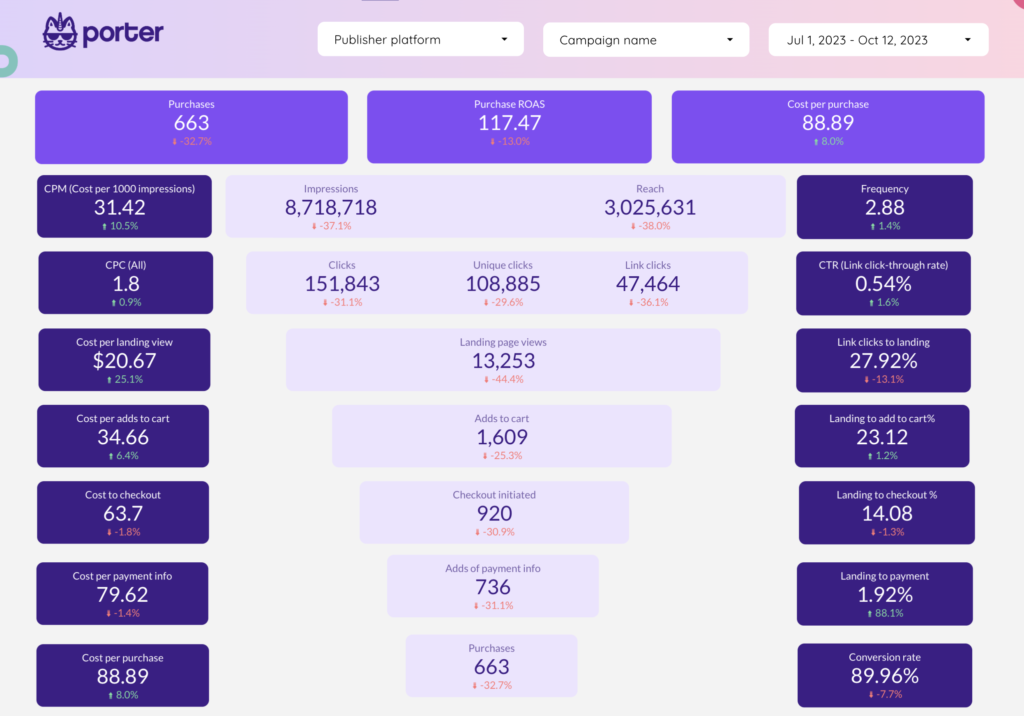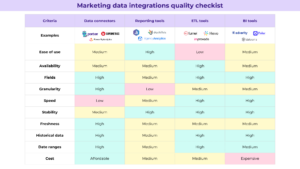Some Dataslayer alternatives include Porter Metrics, Supermetrics, Funnel, Windsor AI, Power My Analytics, AgencyAnalytics, and Polar Analytics.
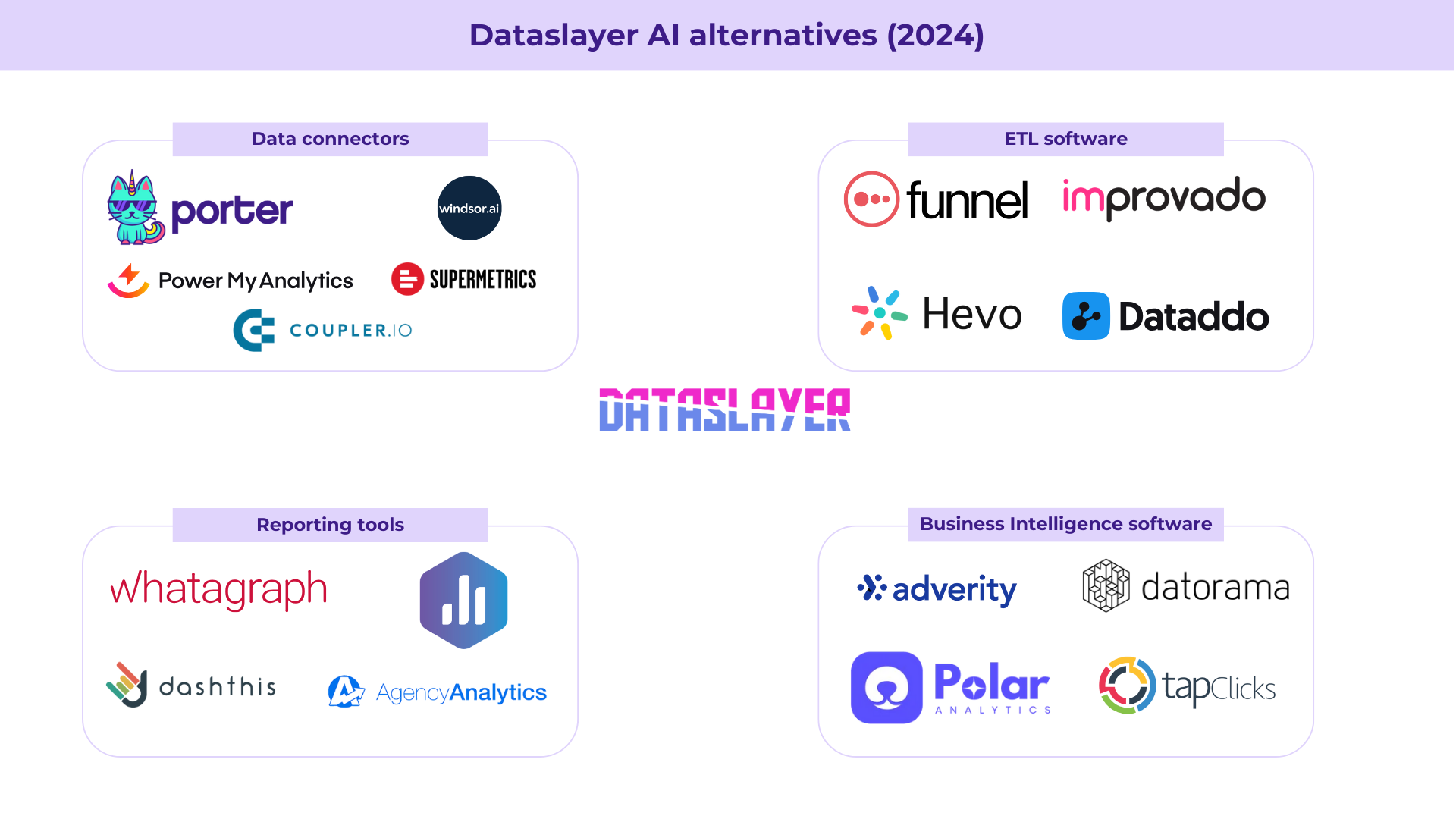
The best Dataslayer alternatives to try
- Porter Metrics for medium-sized marketing teams and agencies.
- Funnel.io for teams that need ETL and data transformation capabilities.
- Windsor AI if you are looking for a marketing attribution solution.
- Power My Analytics data warehouse and data connectors.
- Agency Analytics for marketing agencies needing robust client management.
- Polar Analytics reporting tool for ecommerce brands running on Shopify.
- Supermetrics for marketing teams and agencies that want advanced analytics capabilities.
Dataslayer alternatives comparison at a glance
Dataslayer alternatives feature comparison
| Comparison criteria | Supermetrics | Agency Analytics | Dataslayer | Windsor AI | Power My Analytics | Funnel | Porter Metrics | Polar Analytics |
|---|---|---|---|---|---|---|---|---|
| Data Sources | 200+ | 80+ | 45+ | 200+ | 45 | 500 | 18 | 45 |
| Data sources included in their first plan tier | “Only 4 data sources: Facebook Ads, Google Analytics 4, and Google Ads ⛔️” | All data sources (80+) ✅ | All data sources (45+) ✅ | All data sources (100+) ✅ | All data sources (45+) ✅ | All data sources (230+) ✅ | All data sources included (19+) ✅ | |
| Refresh time frequency | “Hourly, Daily, Weekly ✅” | Daily ✅ | “Daily, with API limits ⛔️” | Daily or hourly ✅ | Daily ✅ | Daily or every 2 hours ✅ | Daily or every 12 hours ✅ | Daily ✅ |
| Refresh time frequency for their first plan tier | Weekly ⛔️ | Daily ✅ | “Daily, with API limits ⛔️” | Daily ✅ | Daily ✅ | Daily ✅ | Daily ✅ | Daily ✅ |
| Report templates | Yes ✅ | Yes ✅ | Yes ✅ | Yes ✅ | Yes ✅ | Yes ✅ | Yes ✅ | Yes ✅ |
| Destinations | 16 | 4 | 13 | 8 | 20+ | 2 | 2 | |
| Starting price | $37/mo | 60/mo | 35/mo | 23/mo | “14,9/mo” | 1100/mo | “14,99/mo” | 300/mo |
| Free trials | Yes✅ | Yes✅ | Yes✅ | Yes✅ | Yes✅ | Yes✅ | Yes✅ | Yes✅ |
| Pricing model | “Based on data sources, user seats, destinations” | Per-client campaign pricing | Usage-based | Based on usage | Based on usage | Usage-based “Flexpoints” | Based on # of accounts connected | Based on order volume |
| Users access | Limited users per plan ⛔️ | Limited users per plan ⛔️ | Limited users per plan ⛔️ | Unlimited users and admins ✅ | Limited users per plan ⛔️ | Limited users per plan ⛔️ | Unlimited users and admins ✅ | Unlimited users and admins ✅ |
| User reviews on G2Crowd | 4.5 | “4,7” | “4,8” | “4,8” | “4,4” | “4,5” | “4,5” | 5 |
| Drawbacks | “Complex pricing, slow/unstable data without paid storage” | Limited data flexibility vs. ETL tools | Unpredictable pricing for high volumes | Some technical skills required | Limited transformation options | “High learning curve, expensive pricing” | Limited integrations compared to competitors | Less flexible than modular tools |
Dataslayer alternatives pricing comparison
Pricing of Dataslayer alternatives vary a lot. We’ve compiled their listed monthly plans, but remember, pricing models differ. For example, Porter Metrics bills per connected account, while Dataslayer bills per API calls. Most offer trials and some have freemium plans.
TL;DR:
If you’re looking for a budget-friendly Dataslayer alternative for your marketing team or agency with predictable pricing, Porter Metrics, Windsor AI, and Power My Analytics are the best choices for balancing features and budget.
AgencyAnalytics might seem better in price at first sight, but the reality is that their pricing per “client campaign” might affect your experience as a user because if you exceed the quotas, your costs will escalate quickly.
And definitely, if you are looking for more advanced features and integrations Funnel.io and Polar Analytics are worth the extra cost.
| Provider | Starting Price | Mid Plan | Highest Price | Average Price | Pricing Unit | Service Type | Free Plans |
|---|---|---|---|---|---|---|---|
| Porter Metrics | $15 | $40 | $180 | $78 | Accounts | Self-Service | 14-day free trial |
| Supermetrics | $37 | $299 | $724 | $370 | Data Sources | Self-Service | 14-day free trial |
| Funnel | $120 | $1,100 | $2,500 | $1,240 | Flexpoints | Self-Service | Freemium |
| Windsor AI | $23 | $118 | $598 | $246 | Data Sources | Self-Service | Freemium |
| Power My Analytics | $15 | $40 | $295 | $117 | Data Sources | Self-Service | 14-day free trial |
| Dataslayer | $35 | $76 | $383 | $165 | API Calls | Self-Service | Freemium |
| AgencyAnalytics | $60 | $180 | $900 | $380 | Client Campaigns | Self-Service | 14-day free trial |
| Polar Analytics | $300 | $450 | $450 | $400 | Orders | Sales Call | No |
| Databox | $47 | $135 | $799 | $327 | Data Source Connections | Self-Service | Freemium |
| Whatagraph | $219 | $499 | $899 | $539 | Source Credits | Sales Call | 7-day free trial |
Generally, the cost of marketing data connectors falls between $15/mo and $200/mo, whereas reporting or ETL tools are priced from $300/mo to $2,000/mo.
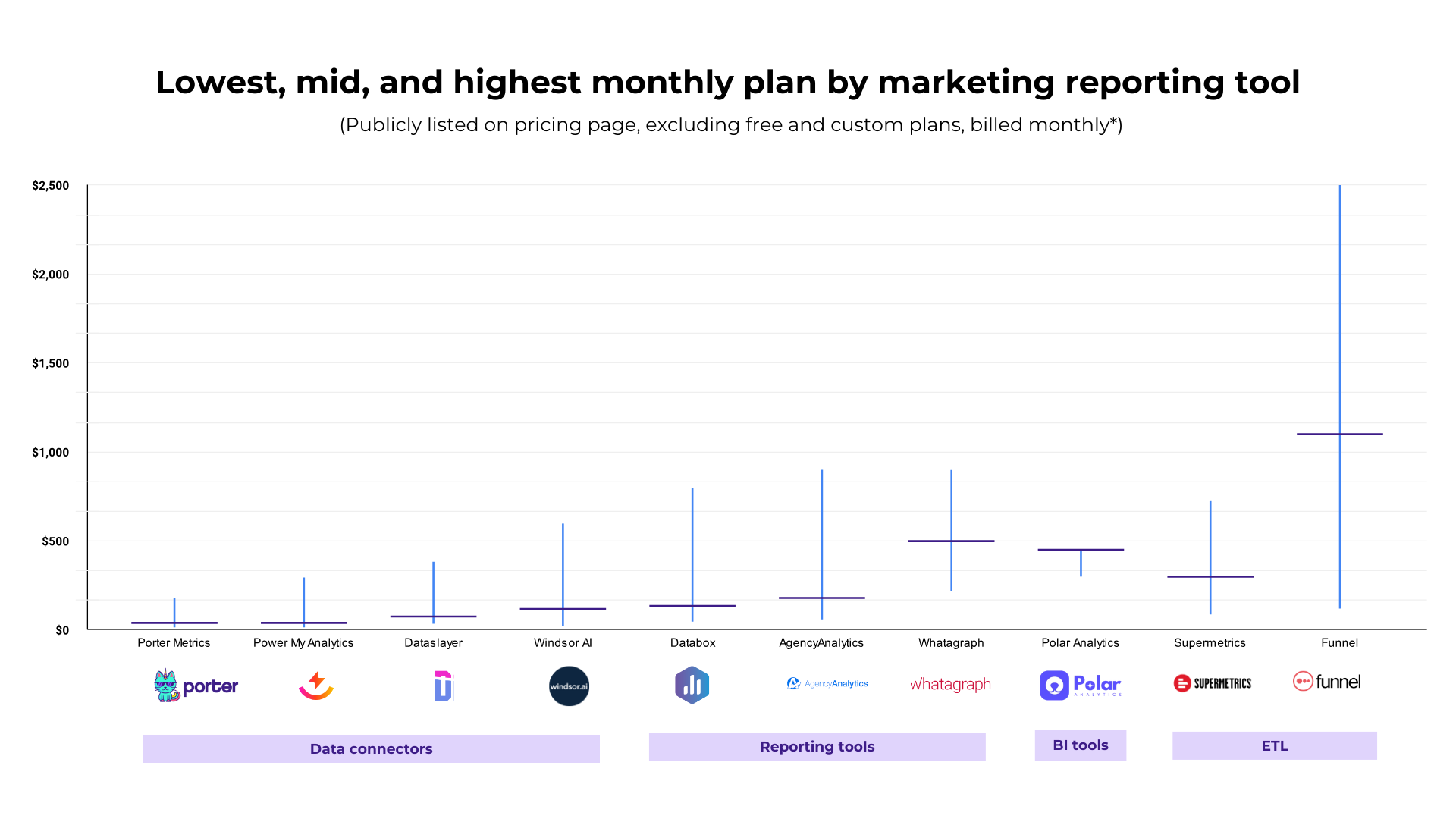
Consider these aspects to compare pricing:
- Compliance and Security: Pay attention to crucial certifications like SOC 2 Type 2 and features like SSO sign-in.
- Service Type: Tools that involve sales or onboarding calls tend to be costlier (about $300/mo), while self-service tools are usually more affordable.
- Documentation and Resources: Having access to tutorials, templates, and comprehensive documentation can optimize your workflow.
- Support and Training: Assess the availability of support, communication channels (chat, email, phone), and the provision of custom training and reporting services.
- Segment: SMBs often prioritize quick setup, ease of use, and flexible, affordable pricing, while enterprises value compliance and security features.
Criteria to choose a Dataslayer alternative
Chiefmartec says there are over 200 marketing analytics solutions, and most also offer marketing reporting automation and data management features, so finding actual alternatives to DataSlayer is tough.
I’ll share my perspective as a marketing analytics tech founder and DataSlayer competitor. You might expect me to favour Porter, but I dive deep into all reporting tools, considering their features and limitations that only become clear after you use them.
I created a framework to help you evaluate and choose a DataSlayer alternative and a marketing reporting tool that evaluates:
Features
- Data integrations – assess quality, ease of use, availability, speed, fields, granularity, stability, accuracy, freshness, historical data access, and date range flexibility.
- Data transformation – look for data normalization, blending, filtering, custom metrics, custom dimensions, and rule-based custom values for complex reporting.
- Destinations – consider options like vertical reporting tools, spreadsheets, data visualization platforms, and data warehouses for reporting, visualization, and automation.
Solution types
Understand the strengths of different marketing analytics software categories:
- Built-in analytics
- Data connectors
- Data visualization tools
- Vertical reporting tools
- Tracking solutions
- Business intelligence platforms
- ETL solutions
- Attribution software
Integrations
When comparing integrations of Dataslayer alternatives, assess criteria such as ease of use, availability, speed, granularity, field, stability, and accuracy.
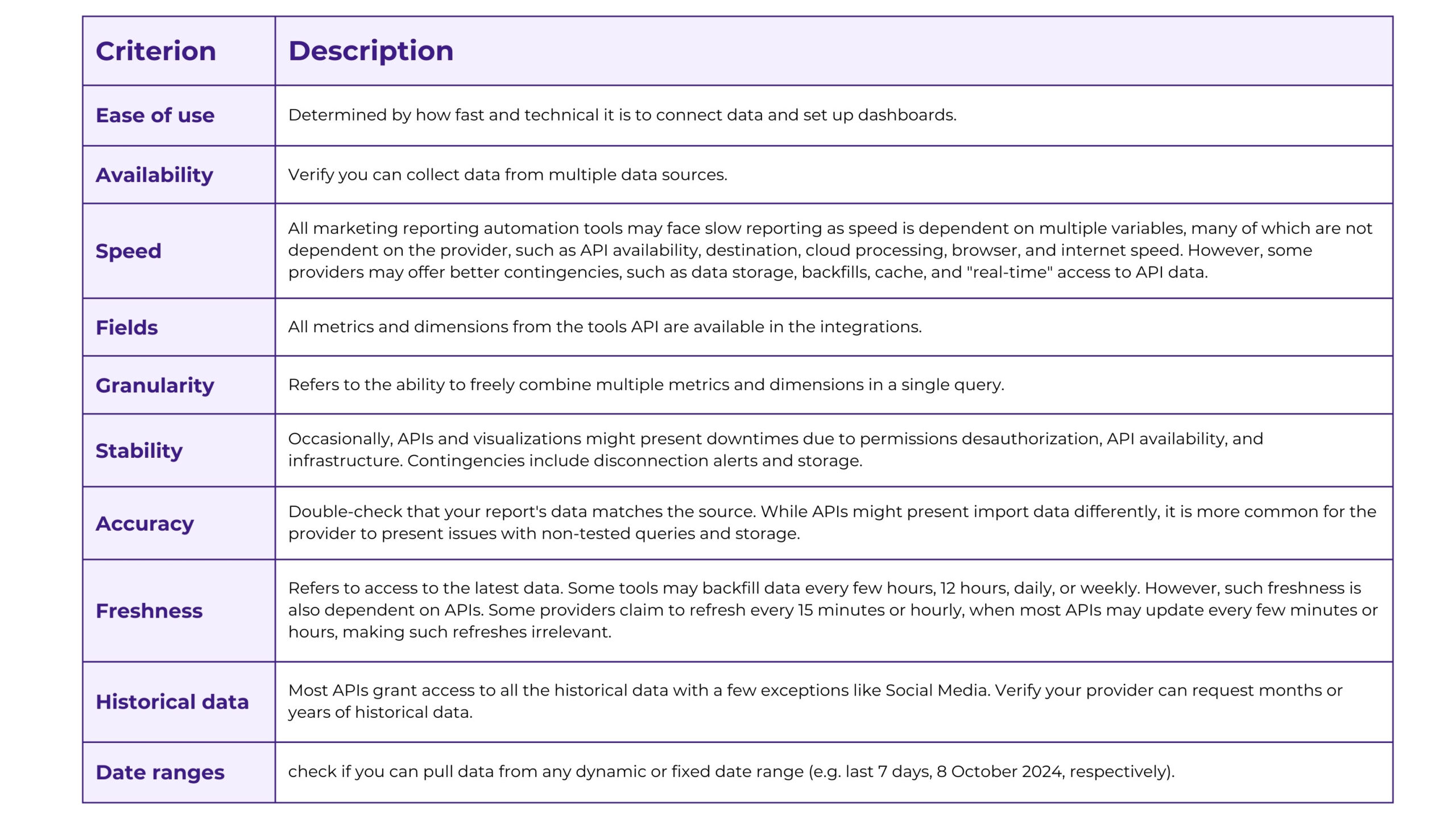
Pricing
- Plans and models – compare pricing plans, models, and average costs of different providers.
- Additional factors – consider compliance, security, service type (self-service vs. sales calls), documentation, resources, support, and training beyond just the numbers.
Other considerations
- User management – check the number of users allowed and costs for additional users.
- Drawbacks – be aware of limitations like limited integrations, complex pricing, high learning curves, or lack of flexibility.
- Ease of use – evaluate the learning curve and user-friendliness.
- Templates – look for pre-built templates to quickly test and implement the tool.
Best Dataslayer alternatives detailed comparison
Porter Metrics
Porter Metrics is a no-code marketing reporting tool to measure marketing performance towards bottom-line, revenue and profit metrics with no data warehouses, scripts, or additional tools required, across all your marketing channels, products, clients, and campaigns.It connects to the most popular B2B and e-commerce marketing data for small businesses such as Shopify, HubSpot, GA4, Facebook Ads, and Instagram, to destinations like Looker Studio (formerly Data Studio) and GoogleSheets.
+100 Looker Studio templates and +100 Youtube tutorials on marketing reporting. Used by +1,500 marketing teams in 60 countries.
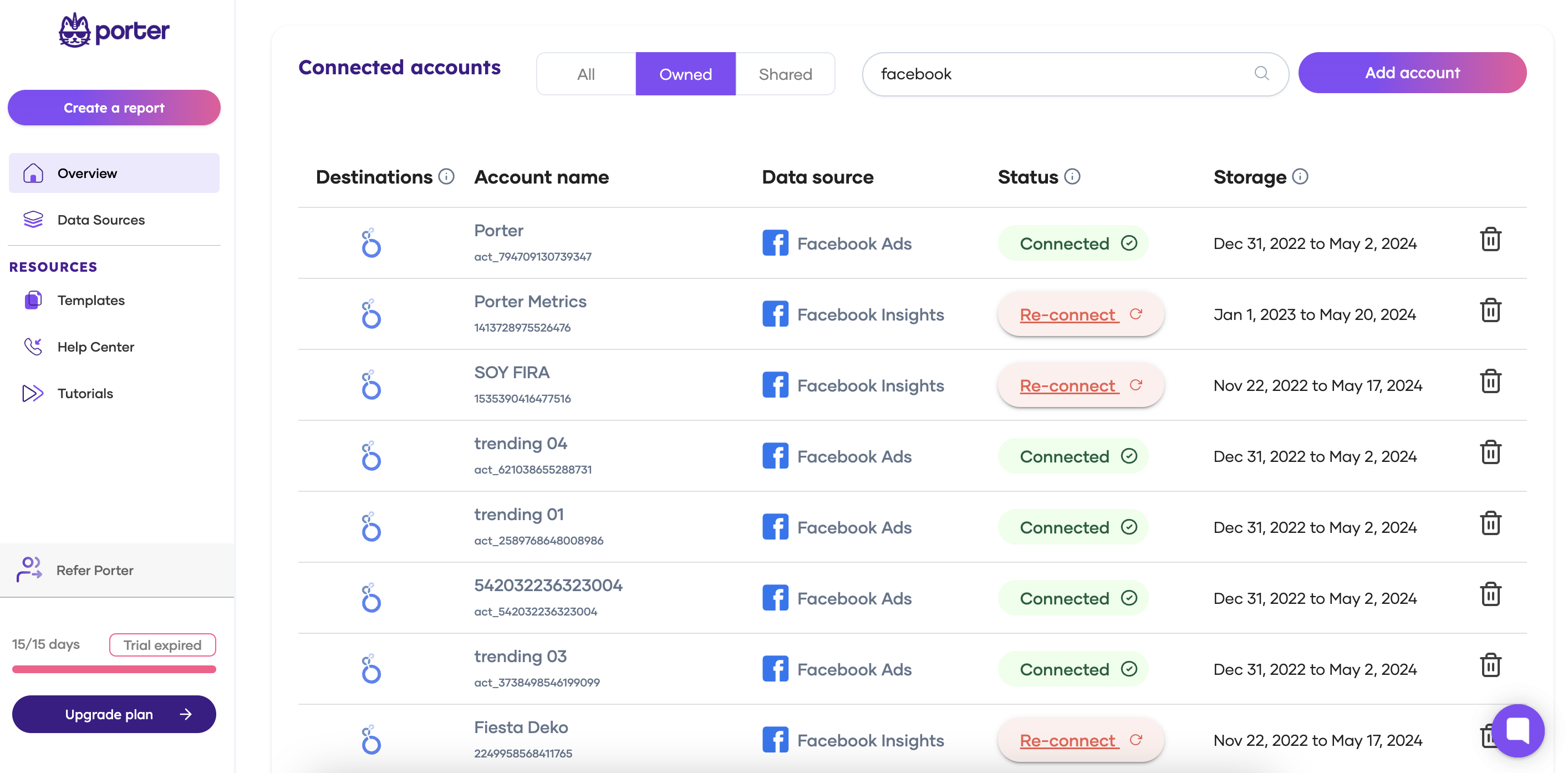
Porter Metrics vs.Dataslayer detailed comparison
| Comparison criteria | Data Sources | Data sources included in their first plan tier | Refresh time frequency | Refresh time frequency for their first plan tier | Report templates | Destinations | Starting price | Free trials | Pricing model | Users access | User reviews on G2Crowd | Drawbacks |
|---|---|---|---|---|---|---|---|---|---|---|---|---|
| Dataslayer | 45+ | All data sources (45+) ✅ | Daily, with API limits ⛔️ | Daily, with API limits ⛔️ | Yes ✅ | 4 | 35/mo | Yes✅ | Usage-based | Limited users per plan ⛔️ | 4,8 | Unpredictable pricing for high volumes |
| Porter Metrics | 18 | All data sources included (19+) ✅ | Daily or every 12 hours ✅ | Daily ✅ | Yes ✅ | 2 | 14,99/mo | Yes✅ | Based on # of accounts connected | Unlimited users and admins ✅ | 4,5 | Limited integrations compared to competitors |
Porter Metrics pricing
Simple, flat pricing based solely on the number of connected accounts across various marketing platforms. Plans range from $14.99/month for 1 account to $180/month for 40 accounts. All plans include unlimited users, data destinations (Looker Studio, Sheets), integrations, with no additional usage fees.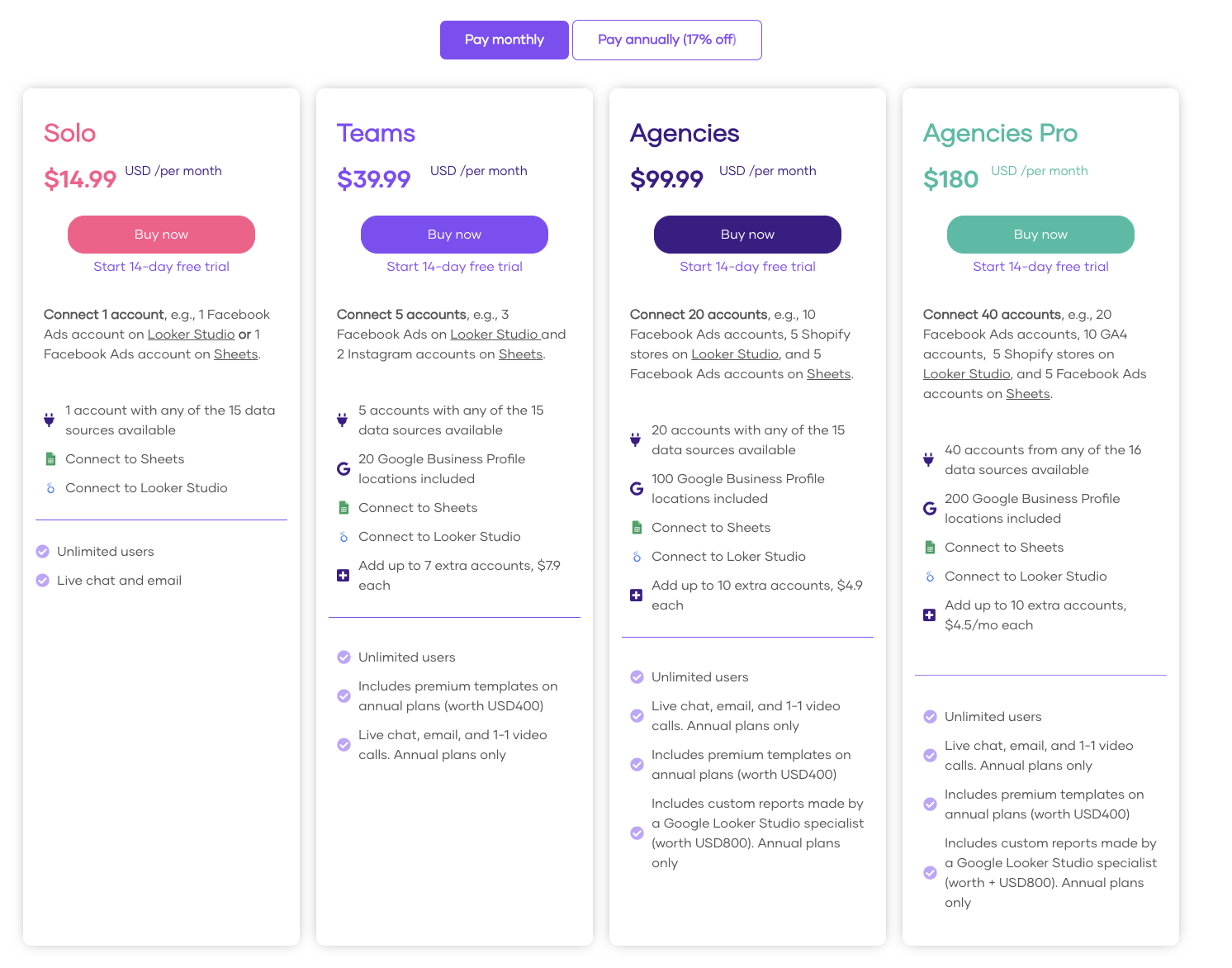
Porter Metrics is ideal for medium-sized marketing teams and agencies seeking a no-code, simple solution with numerous templates and tutorials. It integrates seamlessly with Looker Studio and Google Sheets, storing data in BigQuery for efficient blending and faster report generation.
Porter Metrics eliminates the complexity of API call limits with predictable pricing based on connected accounts and includes unlimited users and data sources in all plans. This makes it a more reliable and economical choice for comprehensive data integration and reporting compared to DataSlayer, which has tricky pricing based on API calls, especially for Looker Studio. DataSlayer’s pricing model can be confusing, as it charges based on API calls and the number of accounts, leading to unpredictable costs.
Additionally, Porter Metrics offers well-designed, highly customizable templates, enhancing its value over DataSlayer. The customer success team provides support in English and Spanish via email, chat, and video calls, ensuring users have the assistance they need.
Pros of choosing Porter Metrics as a Dataslayer alternative
- No-code reporting tool connects to 19+ data sources, including Shopify, HubSpot, Facebook Ads, GA4, Instagram
- Self-managed BigQuery data storage for accurate, stable, fast reporting
- 100+ free Looker Studio report templates and 100+ YouTube tutorials
- Free 1:1 customer support via chat, email, and calls in English and Spanish
- Simple, flexible pricing based on accounts connected; unlimited users, reports, usage
Cons of choosing Porter Metrics as a Dataslayer alternative”
The following are reasons to seek Porter Metrics alternatives.
- Fewer connectors (19+) than some alternatives; focuses on SMBs, agencies, e-commerce, lead gen
- No built-in data transformation features; requires Looker Studio or Sheets for blending, segmentation, custom fields
- Not suitable for large enterprises requiring sales CRM and database integrations (e.g., Salesforce, Adobe)
- May not be appropriate if finding Looker Studio or Sheets too complex for basic reporting needs
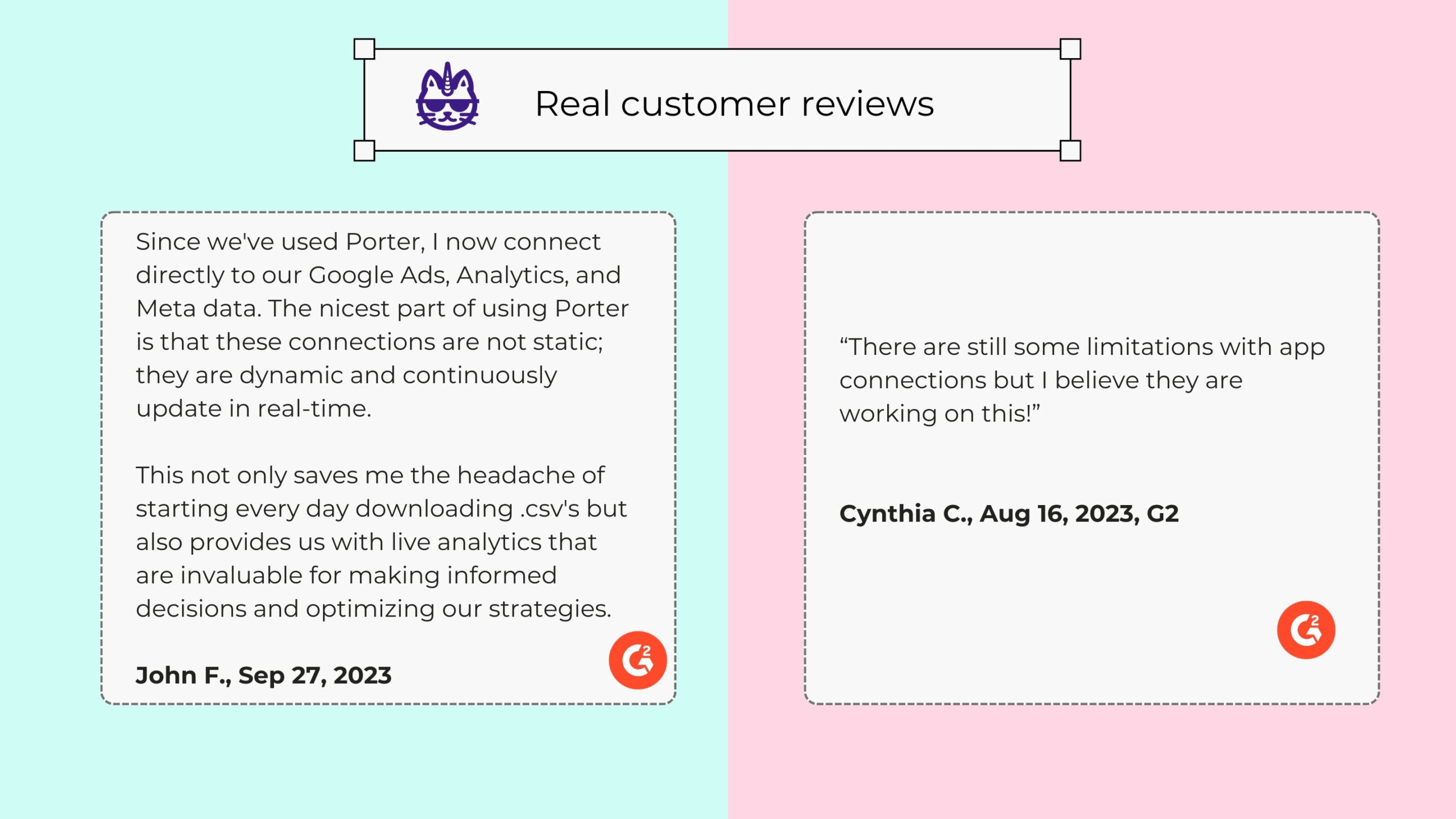
Supermetrics
Supermetrics is a data integration and reporting tool for marketing and sales data. With 200+ integrations for e-commerce, B2B, ads, sales data, Supermetrics is an established market leader with 17,000+ customers, tracks 10%+ global ad spend.Supermetrics collects data from sources like CRMs, analytics tools, and ad platforms, then loads it directly into the destinations teams already use – spreadsheets, visualization tools, data warehouses.

Dataslayer vs.Supermetrics detailed comparison
| Comparison criteria | Data Sources | Data sources included in their first plan tier | Refresh time frequency | Refresh time frequency for their first plan tier | Report templates | Destinations | Starting price | Free trials | Pricing model | Users access | User reviews on G2Crowd | Drawbacks |
|---|---|---|---|---|---|---|---|---|---|---|---|---|
| Dataslayer | 45+ | All data sources (45+) ✅ | Daily, with API limits ⛔️ | Daily, with API limits ⛔️ | Yes ✅ | 4 | 35/mo | Yes✅ | Usage-based | Limited users per plan ⛔️ | 4,8 | Unpredictable pricing for high volumes |
| Supermetrics | 200+ | Only 4 data sources: Facebook Ads, Google Analytics 4, and Google Ads ⛔️ | Hourly, Daily, Weekly ✅ | Weekly ⛔️ | Yes ✅ | 16 | $37/mo | Yes✅ | Based on data sources, user seats, destinations | Limited users per plan ⛔️ | 4.5 | Complex pricing, slow/unstable data without paid storage |
Supermetrics pricing
Supermetrics pricing is based on number of integrations, accounts per data source, and destinations. Higher tiers unlock more integrations, while agencies may need custom plans for additional accounts. Pricing varies across destinations, with spreadsheets and Looker Studio being more affordable compared to Power BI and data warehouses.Plans range from $37/month for the Essential plan with 1 user and 11 data sources, up to $724/month for the Super plan with 1 user and 82 sources. Enterprise custom pricing is available for unlimited users and 119 sources.
Additional costs include $87-$724 per extra user and $24 per additional data source. All plans include automated data refreshes and connectors.
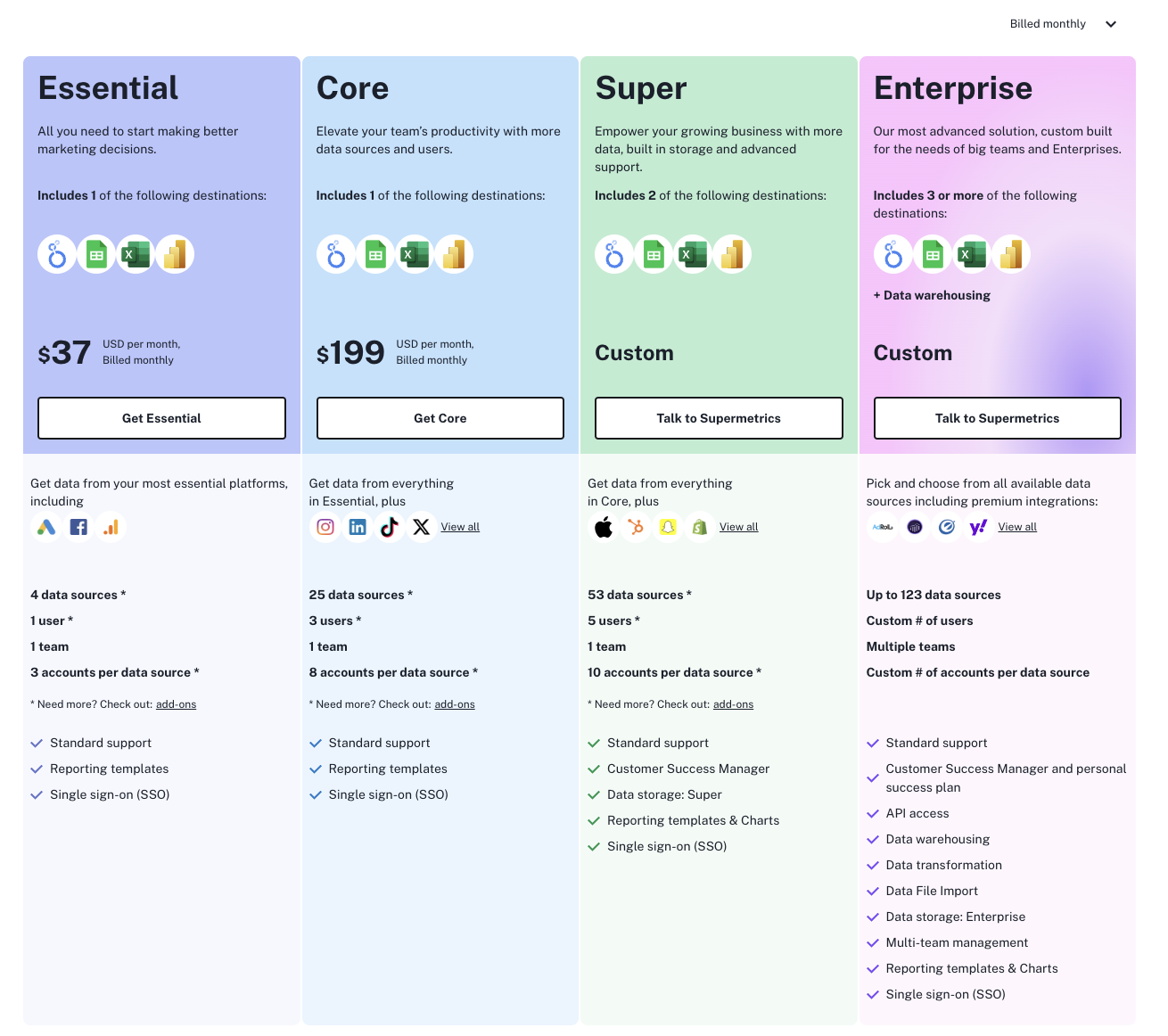
Who is Supermetrics best for?
Supermetrics offers a broader range of data sources and destinations, making it suitable for businesses needing extensive integration options and advanced data manipulation.
DataSlayer is cost-effective for PPC/SEM marketers and agencies needing a flexible reporting tool that integrates seamlessly with Google Sheets, Looker Studio, various BI tools, and BigQuery. The specific drawback is its pricing model based on API calls and the number of accounts, which can lead to unpredictable costs or unpredictable limits on usage.
Pros of choosing Supermetrics as a Dataslayer alternative
- 200+ integrations including Salesforce, Shopify, Facebook Ads, Google Analytics
- Data destinations: Google Sheets, Excel, Looker Studio, BigQuery, Snowflake
- Data transformation feature, built-in storage, and APIs allow companies to create custom fields to calculate CPAs, run reports faster, and store data in their own databases
- Multilanguage field translation for users
Cons of choosing Supermetrics over Dataslayer
The following are reasons to look for Supermetrics alternatives.
- Complex, inflexible and expensive pricing based on number of data sources, accounts per data source, users, data sources available only on certain plans, and destination
- Data transformation features, built-in storage, and APIs are only available in enterprise plans
- “Canned answers” and slow, rigid email/chat support reported by users
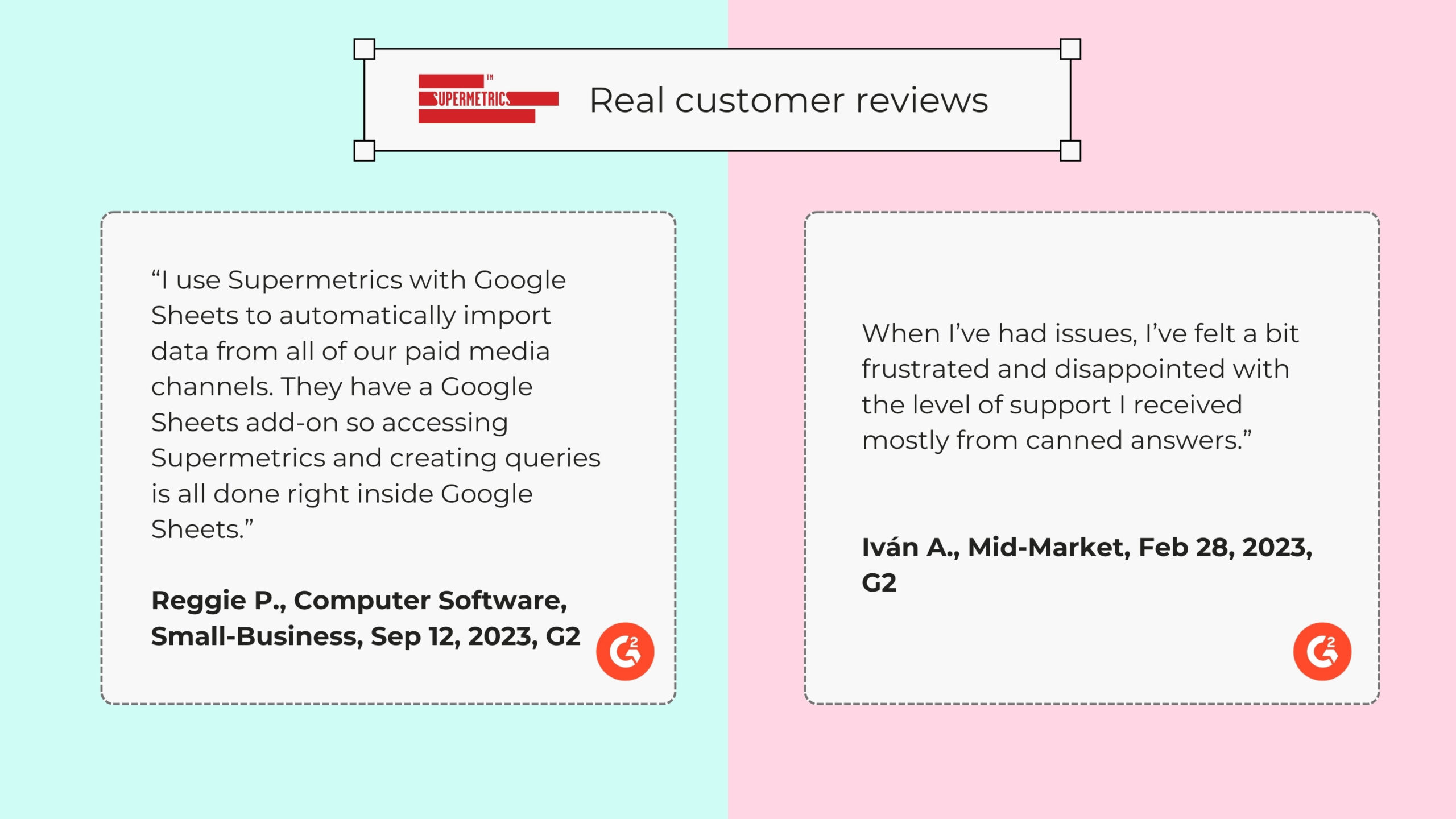
Funnel
Funnel.io is an ETL tool with 500+ marketing and sales integrations, 10+ destinations including data warehouses, visualization tools, spreadsheets. Has ‘managed data warehouse’ model, pre-storing data for speed, stability, potentially affecting data granularity, timeliness.Known for data transformation layer enabling custom metrics, currency conversions, cross-channel normalization, and blending. No-code tool but requires high technical proficiency akin to spreadsheet power users.
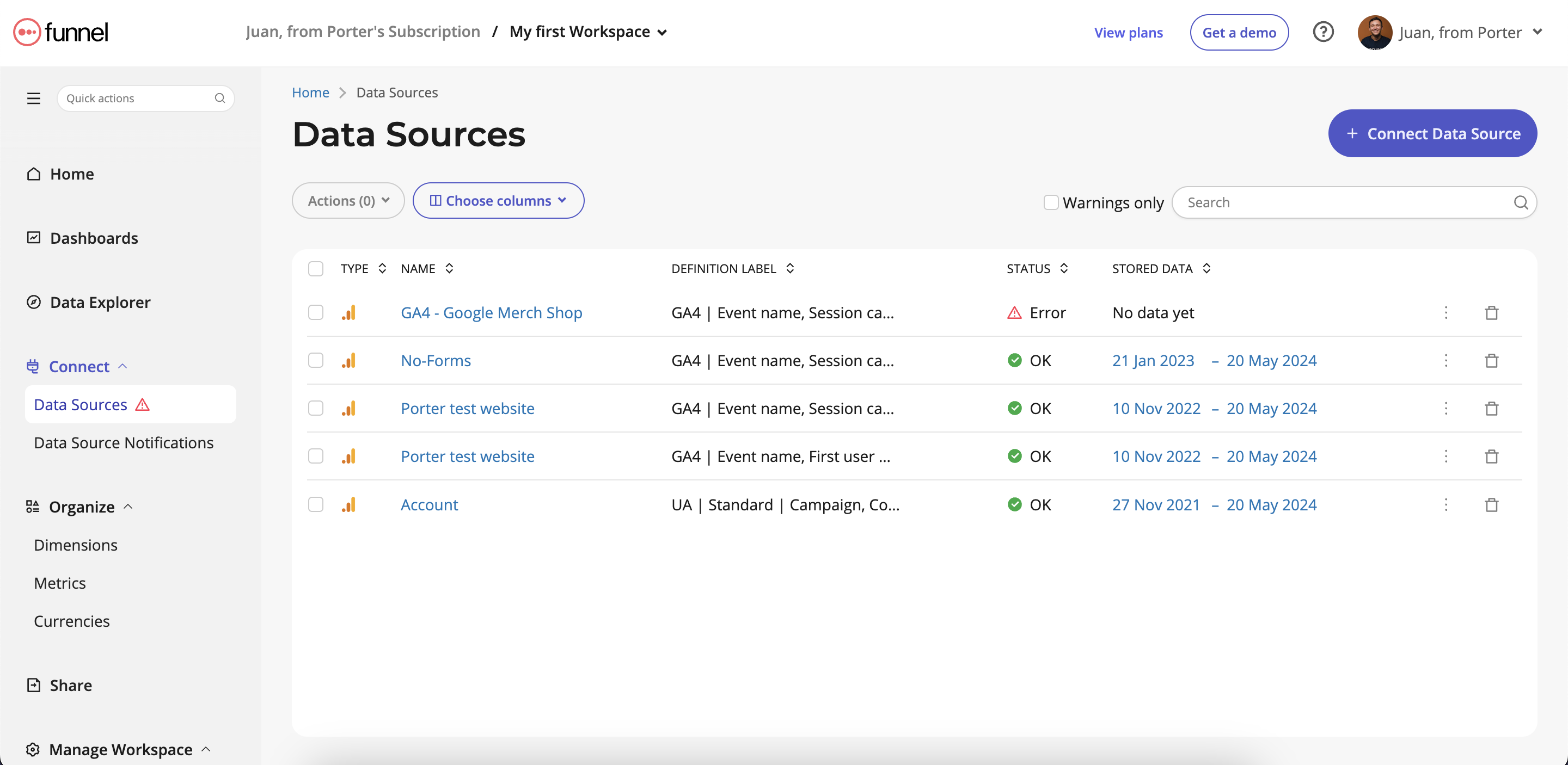
Dataslayer vs. Funnel detailed comparison
| Comparison criteria | Data Sources | Data sources included in their first plan tier | Refresh time frequency | Refresh time frequency for their first plan tier | Report templates | Destinations | Starting price | Free trials | Pricing model | Users access | User reviews on G2Crowd | Drawbacks |
|---|---|---|---|---|---|---|---|---|---|---|---|---|
| Dataslayer | 45+ | All data sources (45+) ✅ | Daily, with API limits ⛔️ | Daily, with API limits ⛔️ | Yes ✅ | 4 | 35/mo | Yes✅ | Usage-based | Limited users per plan ⛔️ | 4,8 | Unpredictable pricing for high volumes |
| Funnel | 500 | All data sources (230+) ✅ | Daily or every 2 hours ✅ | Daily ✅ | Yes ✅ | 20+ | 1100/mo | Yes✅ | Usage-based “Flexpoints” | Limited users per plan ⛔️ | 4,5 | High learning curve, expensive pricing |
Funnel pricing
Utilizes a complex “flexpoints” pricing system calculated based on data sources and destinations. Has a free Starter plan with 350 flexpoints, $1,100/month Business plan with 3,500 flexpoints, and custom Enterprise pricing. Number of flexpoints varies by integration type.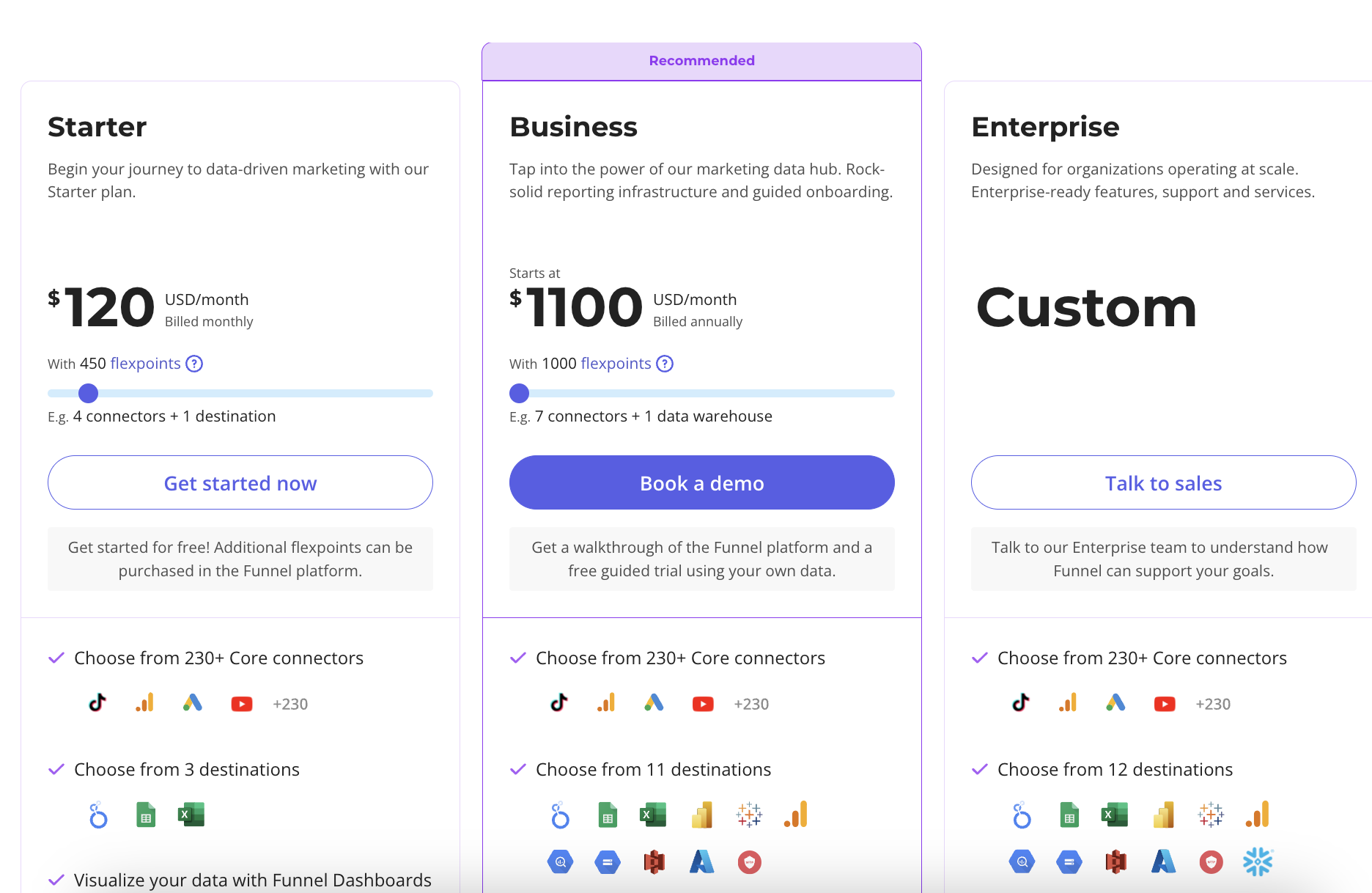
Who is Funnel best for?
Funnel.io provides powerful data transformation capabilities and supports a wide range of data sources and destinations, making it suitable for businesses needing extensive data integration and manipulation options. Its built-in data warehousing is ideal for technical teams requiring comprehensive data solutions.
DataSlayer, however, is cost-effective for PPC/SEM marketers and agencies needing a flexible reporting tool that integrates seamlessly with Google Sheets, Looker Studio, various BI tools, and BigQuery. Its usage model based on API calls can lead to unpredictable limits for teams with more intensive data usage for Looker Studio and Google Sheets.
Pros of choosing Funnel as a Dataslayer alternative
- Integrations include Shopify, HubSpot, Salesforce, Facebook Ads, Google Analytics
- Unifies cross-channel data, conversion windows, and agency markup rules at campaign level
- Faster Looker Studio and Google Sheets reports compared to direct connectors
- GDPR and SOC 2 compliance for enterprise marketing data governance
Cons of choosing Funnel over Dataslayer
The following are reasons to look for Funnel alternatives.
- Monthly cost reaches hundreds to thousands of dollars based on usage, called ‘Flexpoints’
- Built for analysts or technical marketers; requires understanding of APIs, schemas, formulas, transformations for each connector
- Each table/endpoint may require setup, contrasting direct full-connector syncing
- While some data connectors offer “real-time” data from APIs for instant reports, Funnel’s approach may lead to delays of several hours before data becomes available
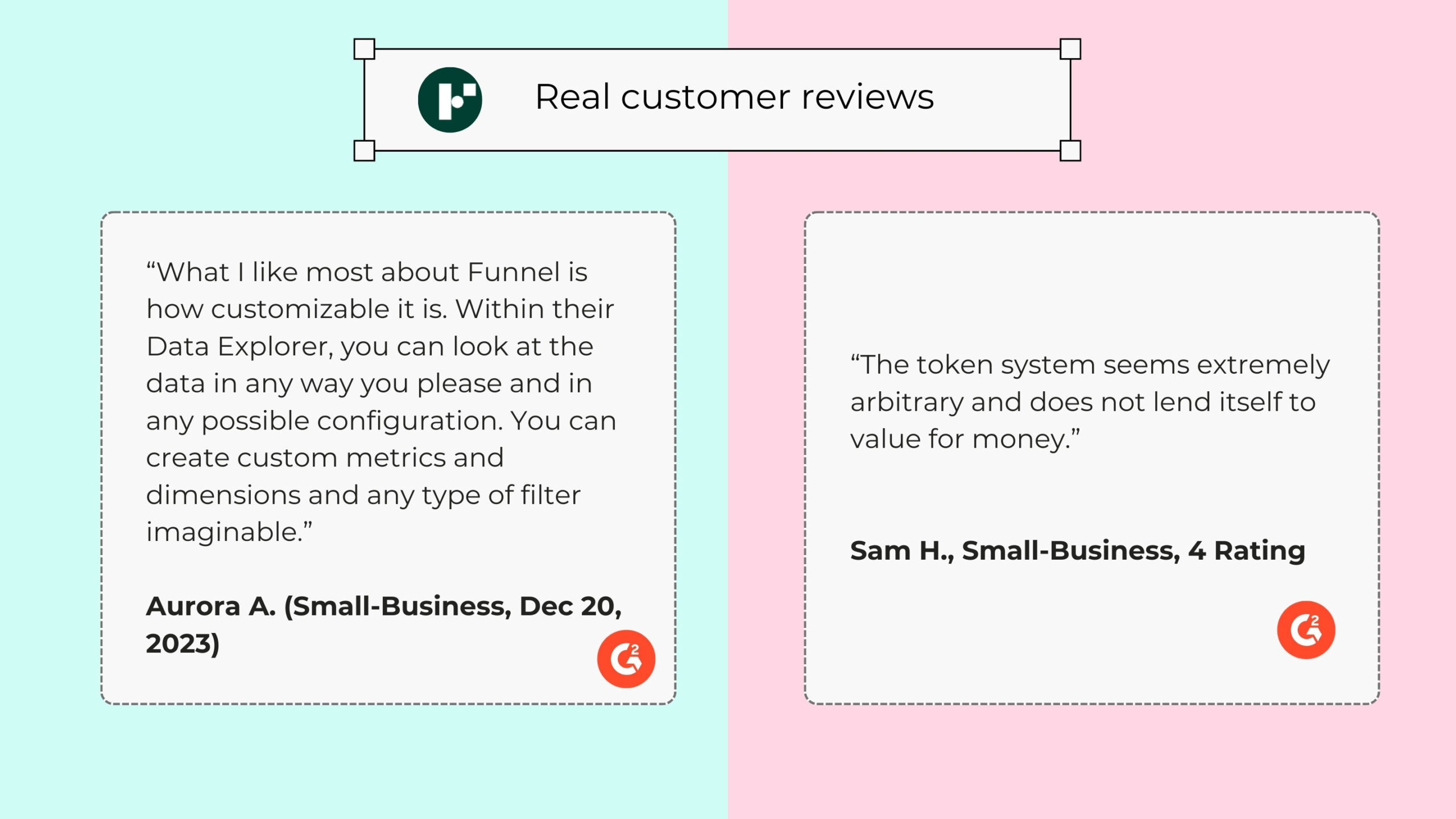
Windsor AI
Windsor is an ETL tool and marketing attribution software. Since 2019, it has developed over 300 integrations for data collection and data pipelines, built for technical marketers and data analysts.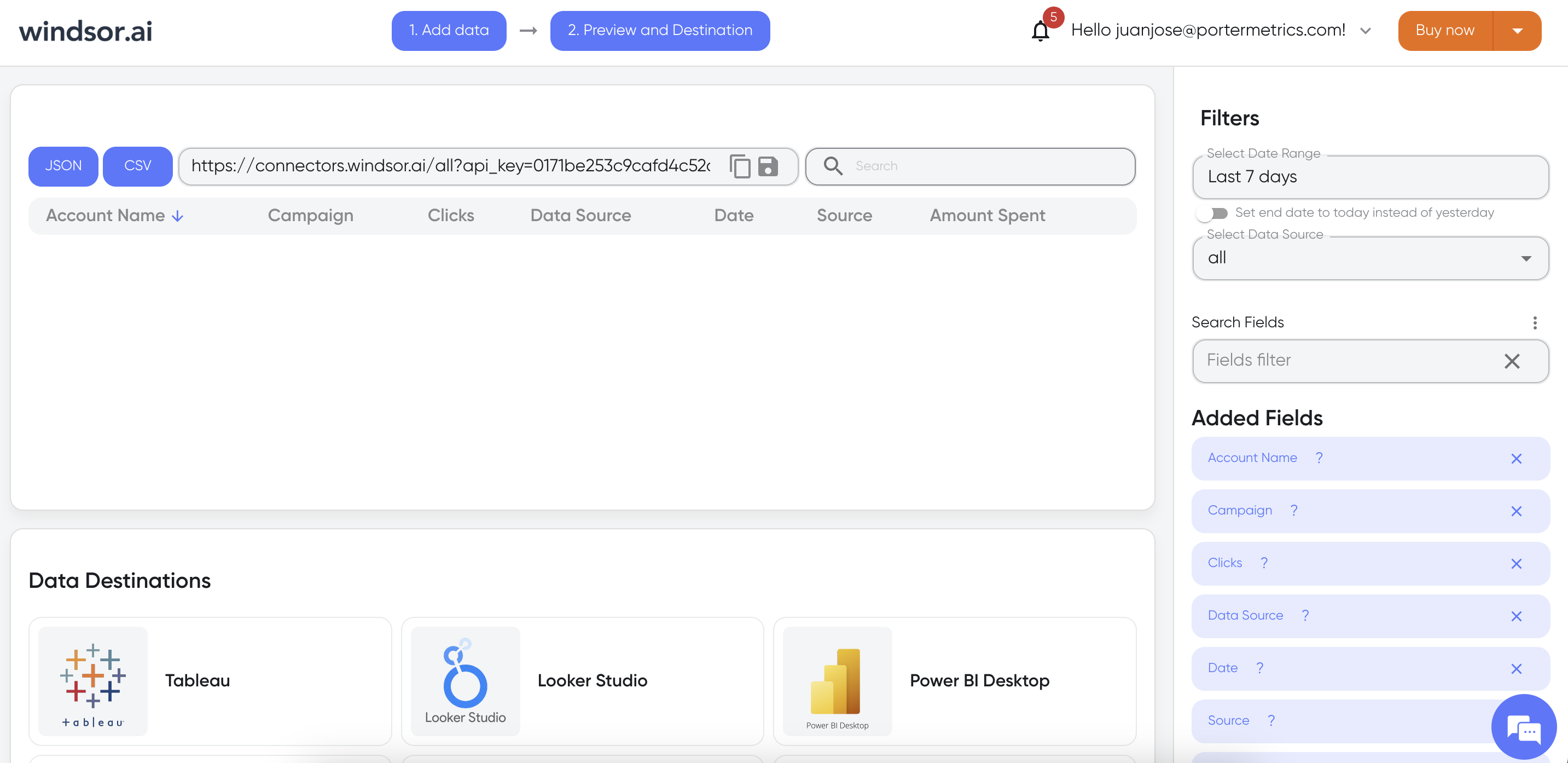
Dataslayer vs. Windsor AI detailed comparison
| Comparison criteria | Data Sources | Data sources included in their first plan tier | Refresh time frequency | Refresh time frequency for their first plan tier | Report templates | Destinations | Starting price | Free trials | Pricing model | Users access | User reviews on G2Crowd | Drawbacks |
|---|---|---|---|---|---|---|---|---|---|---|---|---|
| Dataslayer | 45+ | All data sources (45+) ✅ | Daily, with API limits ⛔️ | Daily, with API limits ⛔️ | Yes ✅ | 4 | 35/mo | Yes✅ | Usage-based | Limited users per plan ⛔️ | 4,8 | Unpredictable pricing for high volumes |
| Windsor AI | 200+ | All data sources (100+) ✅ | Daily or hourly ✅ | Daily ✅ | Yes ✅ | 13 | 23/mo | Yes✅ | Based on usage | Unlimited users and admins ✅ | 4,8 | Some technical skills required |
Windsor AI pricing
Flexible pricing model ranging from a free plan to $598/month Professional plan. Pricing is determined by the number of data sources (1-14), connected accounts (1-500 accounts), and additional enterprise features like invoicing and SLAs. Unlimited users and destinations included.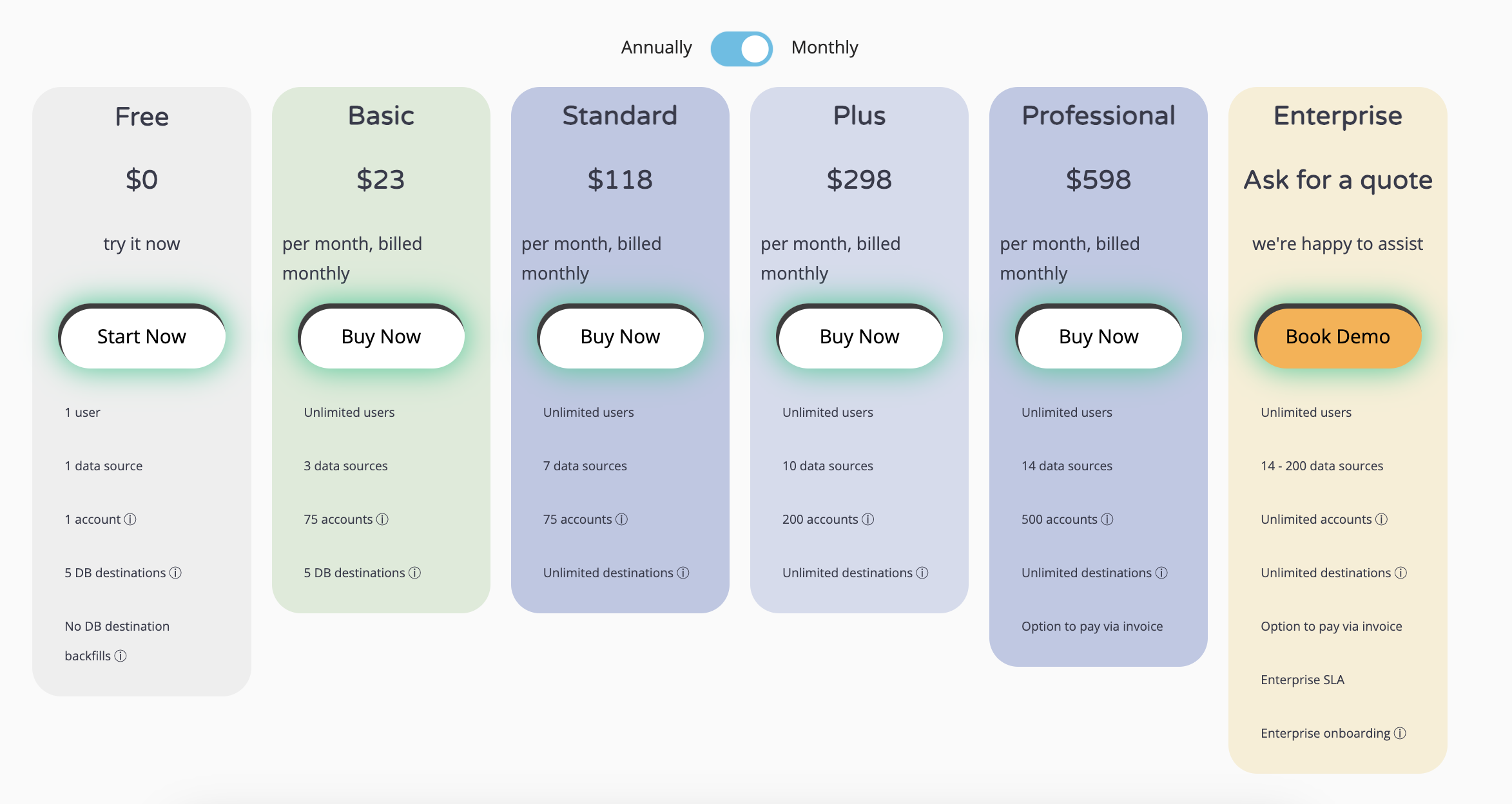
Who is Windsor AI best for?
Windsor.ai provides comprehensive multi-touch attribution analysis, helping businesses understand the full impact of their marketing efforts across various channels. Its flexible pricing model based on data sources, accounts, and destinations makes it adaptable for different needs.
However, DataSlayer offers a cost-effective and flexible reporting tool for PPC/SEM marketers and agencies, integrating seamlessly with Google Sheets, Looker Studio, and various BI tools. Its pricing model based on API calls can be more predictable for teams with lower data volumes.
Pros of choosing Windsor AI as a Dataslayer alternative
- 200+ Integrations: Google Analytics, Salesforce, HubSpot, Facebook Ads, Shopify
- Affordable, flexible pricing based on the number of data sources, accounts, and destinations connected
- Combines data across platforms for ROAS/CAC reporting by channel, campaign, creative, cohort for optimization
- Users cite fast support and responsiveness from founders to guide implementation
Cons of choosing Windsor AI over Dataslayer
The following are reasons to look for Windsor AI alternatives.
- Metrics differ from native platforms; tricky to find; needs better documentation
- Challenging for marketers expecting plug-and-play; not intuitive for non-technical users expecting Looker Studio simplicity
- If you have multiple data sources (5+), their pricing becomes less efficient as they offer multiple accounts from the same data source
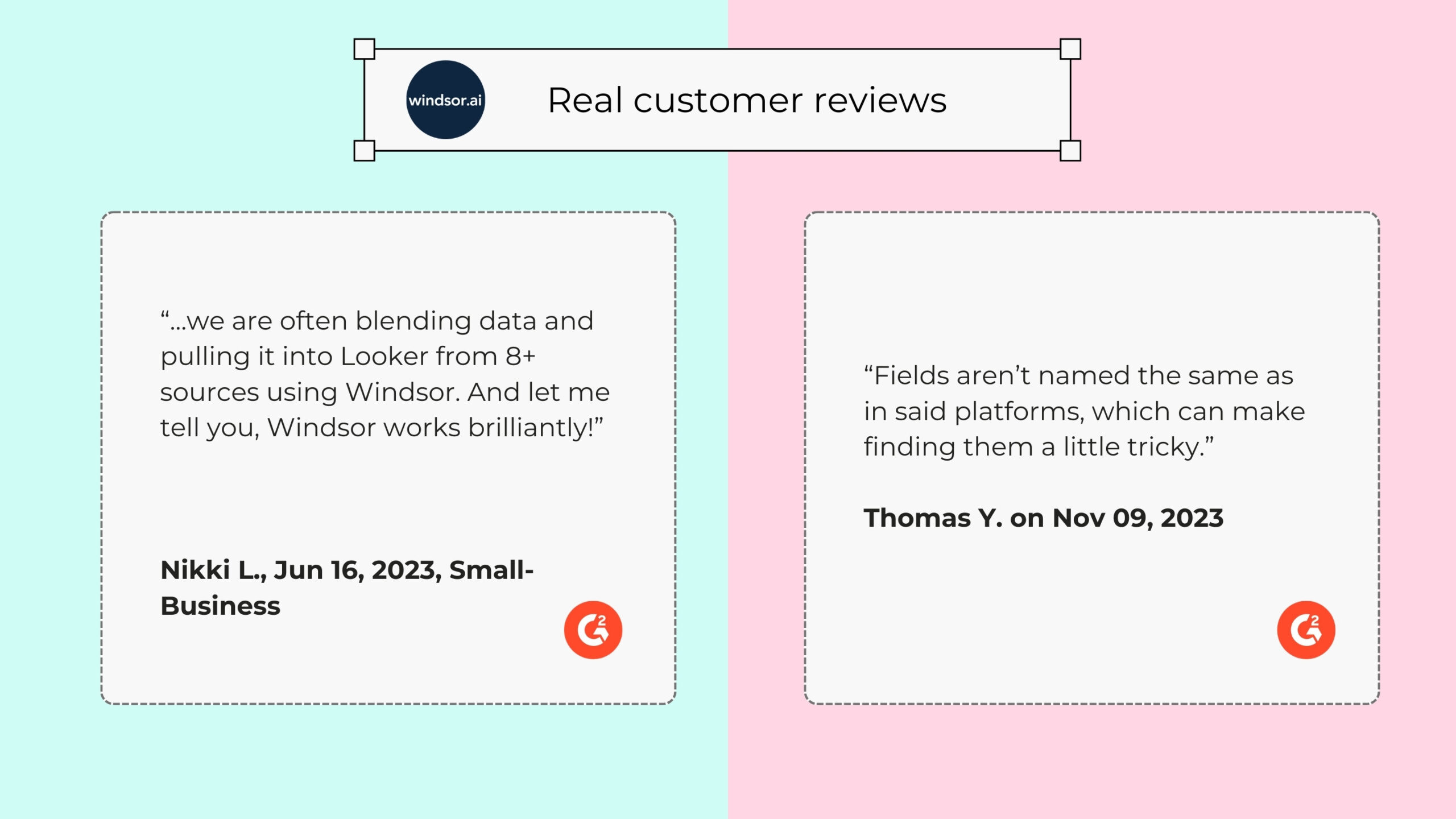
Power My Analytics
Power My Analytics is a no-code ETL tool offering direct marketing data source integrations to destinations like Looker Studio, Sheets, Analytics, Excel, BigQuery, and its API. At Porter Metrics, we benchmark it favorably for quality, customer satisfaction, and reliability.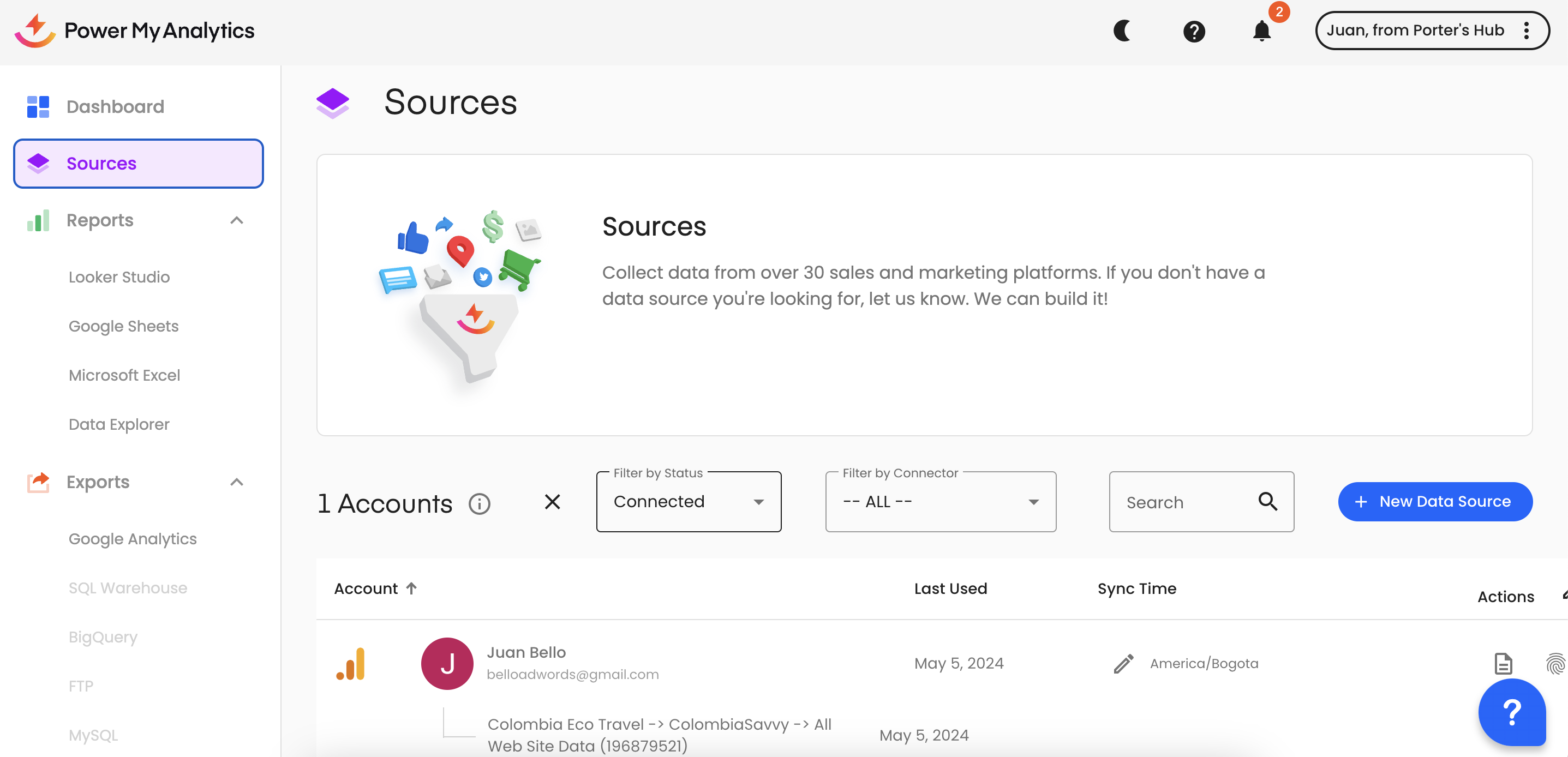
Dataslayer vs. Power My Analytics detailed comparison
| Comparison criteria | Data Sources | Data sources included in their first plan tier | Refresh time frequency | Refresh time frequency for their first plan tier | Report templates | Destinations | Starting price | Free trials | Pricing model | Users access | User reviews on G2Crowd | Drawbacks |
|---|---|---|---|---|---|---|---|---|---|---|---|---|
| Dataslayer | 45+ | All data sources (45+) ✅ | Daily, with API limits ⛔️ | Daily, with API limits ⛔️ | Yes ✅ | 4 | 35/mo | Yes✅ | Usage-based | Limited users per plan ⛔️ | 4,8 | Unpredictable pricing for high volumes |
| Power My Analytics | 45 | All data sources (45+) ✅ | Daily ✅ | Daily ✅ | Yes ✅ | 8 | 14,9/mo | Yes✅ | Based on usage | Limited users per plan ⛔️ | 4,4 | Limited transformation options |
Power My Analytics pricing
Starts at $14.95/month for 1 data source and 1 account. Scales up to $295/month for 40 sources, unlimited accounts per source, data warehousing, and 4+ admin users. Additional fees for Google Sheets ($50/month) and Google Business Profile integration.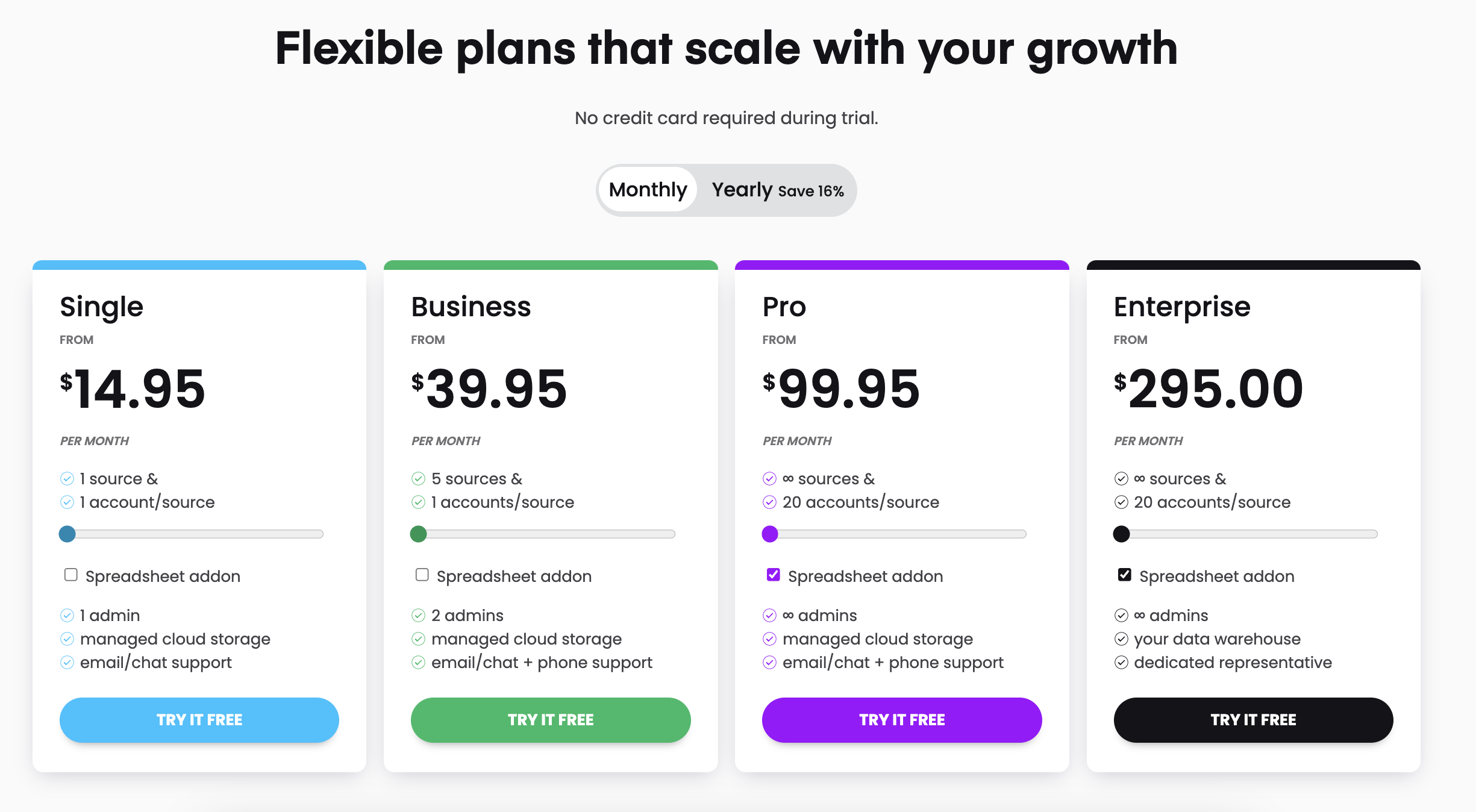
Who is Power My Analytics best for?
DataSlayer provides an affordable and flexible reporting tool that integrates seamlessly with Google Sheets, Looker Studio, and various BI tools. Its API call-based pricing can be more cost-effective for teams with lower data volumes and those focused on PPC/SEM reporting.
Conversely, Power My Analytics offers a flexible pricing model based on the number of accounts, data sources, and destinations, which can be beneficial for PPC and e-commerce marketers who need granular data access and a cost-effective solution for managing multiple ad accounts.
Pros of choosing Power My Analytics as a Dataslayer alternative
- Direct connector to Looker Studio, Sheets, Analytics, Excel, BigQuery, API
- Automatic storage: PMA backfills data into a cloud storage for fast, reliable integrations without needing additional warehouse setup
- Great customer support: Fast support, complete documentation, and the possibility to schedule free onboarding sessions
- Usually good performance in terms of report speed
Cons of choosing Power My Analytics over Dataslayer
The following are reasons to look for Power My Analytics alternatives.
- No built-in data transformation: Users need to send raw data to a destination to blend, clean, or calculate custom fields
- First-time users need help with possible dimensions/metrics and platform limitations
- Technical concepts like combining metrics/dimensions can be challenging for novice marketers
- Integrations don’t include all API fields; combining different data types from the same source can break reports
AgencyAnalytics
Agency Analytics is a reporting and dashboarding tool for marketing agencies, offering unique features like SEO monitoring and client-staff communication management.It’s a good starting point for non-technical agency marketers transitioning from manual reporting, despite potential limitations in flexibility and features compared to data connectors or ETL solutions. Agency Analytics remains superior in ease of use to BI tools like Google Looker Studio.
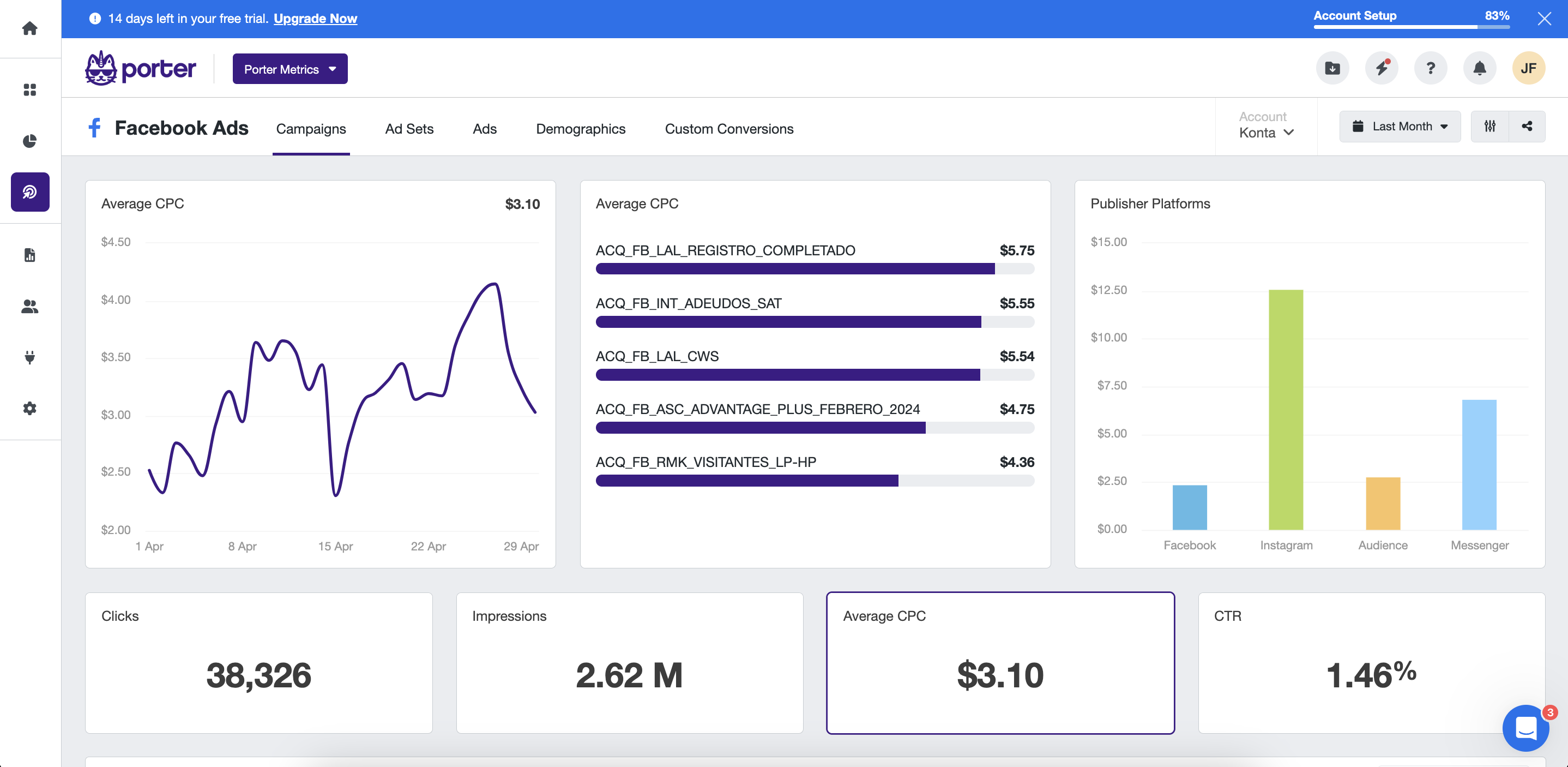
Dataslayer vs. AgencyAnalytics detailed comparison
| Comparison criteria | Data Sources | Data sources included in their first plan tier | Refresh time frequency | Refresh time frequency for their first plan tier | Report templates | Destinations | Starting price | Free trials | Pricing model | Users access | User reviews on G2Crowd | Drawbacks |
|---|---|---|---|---|---|---|---|---|---|---|---|---|
| Dataslayer | 45+ | All data sources (45+) ✅ | Daily, with API limits ⛔️ | Daily, with API limits ⛔️ | Yes ✅ | 4 | 35/mo | Yes✅ | Usage-based | Limited users per plan ⛔️ | 4,8 | Unpredictable pricing for high volumes |
| Agency Analytics | 80+ | All data sources (80+) ✅ | Daily ✅ | Daily ✅ | Yes ✅ | 2 | 60/mo | Yes✅ | Per-client campaign pricing | Limited users per plan ⛔️ | 4,7 | Limited data flexibility vs. ETL tools |
AgencyAnalytics pricing
AgencyAnalytics pricing is based on “client campaigns” which are combinations of connected accounts like websites and ad platforms per client.Plans:
Freelancer: Starts at $60/month for minimum 5 client campaigns at $12 each
Agency: Starts at $180/month for minimum 10 client campaigns at $18 each
Enterprise: Starts around $900/month for minimum 50 client campaigns
Advanced features like white-labeling, custom metrics/dashboards, and agency management tools are included in higher-tier Agency and Enterprise plans.
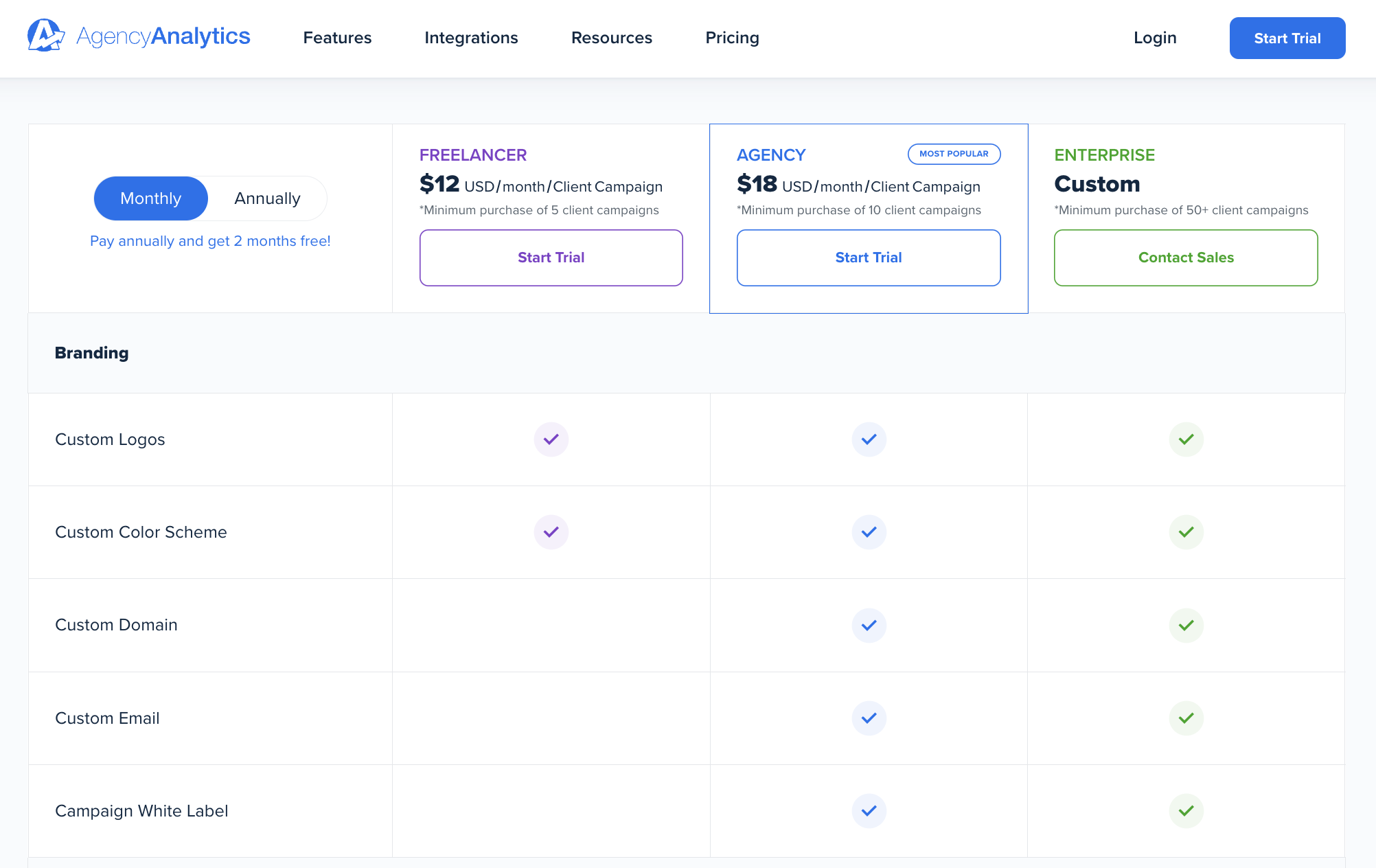
Who is AgencyAnalytics best for?
Funnel.io provides powerful data transformation capabilities and supports a wide range of data sources and destinations, making it suitable for businesses needing extensive data integration and manipulation options. Its built-in data warehousing is ideal for technical teams requiring comprehensive data solutions.
DataSlayer, however, is cost-effective for PPC/SEM marketers and agencies needing a flexible reporting tool that integrates seamlessly with Google Sheets, Looker Studio, various BI tools, and BigQuery. Its usage model based on API calls can lead to unpredictable limits for teams with more intensive data usage for Looker Studio and Google Sheets.
Pros of choosing AgencyAnalytics as a Dataslayer alternative
- Pre-built marketing agency reporting templates and workflows for client reporting
- Faster than assembling comparable views in Looker Studio with minimal setup
- Filter Facebook Ads by campaign; blend Google Analytics + CRM data; set markup %
- Fast data access by syncing with API data to cloud storage proactively
Cons of choosing AgencyAnalytics over Dataslayer
The following are reasons to look for AgencyAnalytics alternatives.
- Can’t combine Facebook Ads metrics by device, demographics, or creatives in the same query
- Doesn’t allow cleaning, tagging, or grouping data with custom dimensions, unlike Looker Studio, Sheets with REGEX, or Funnel
- Lacks transformation features like regex to clean URLs or group by site section
- Costs scale fast: charges per “client campaign” combination of connected accounts, unlike per account pricing
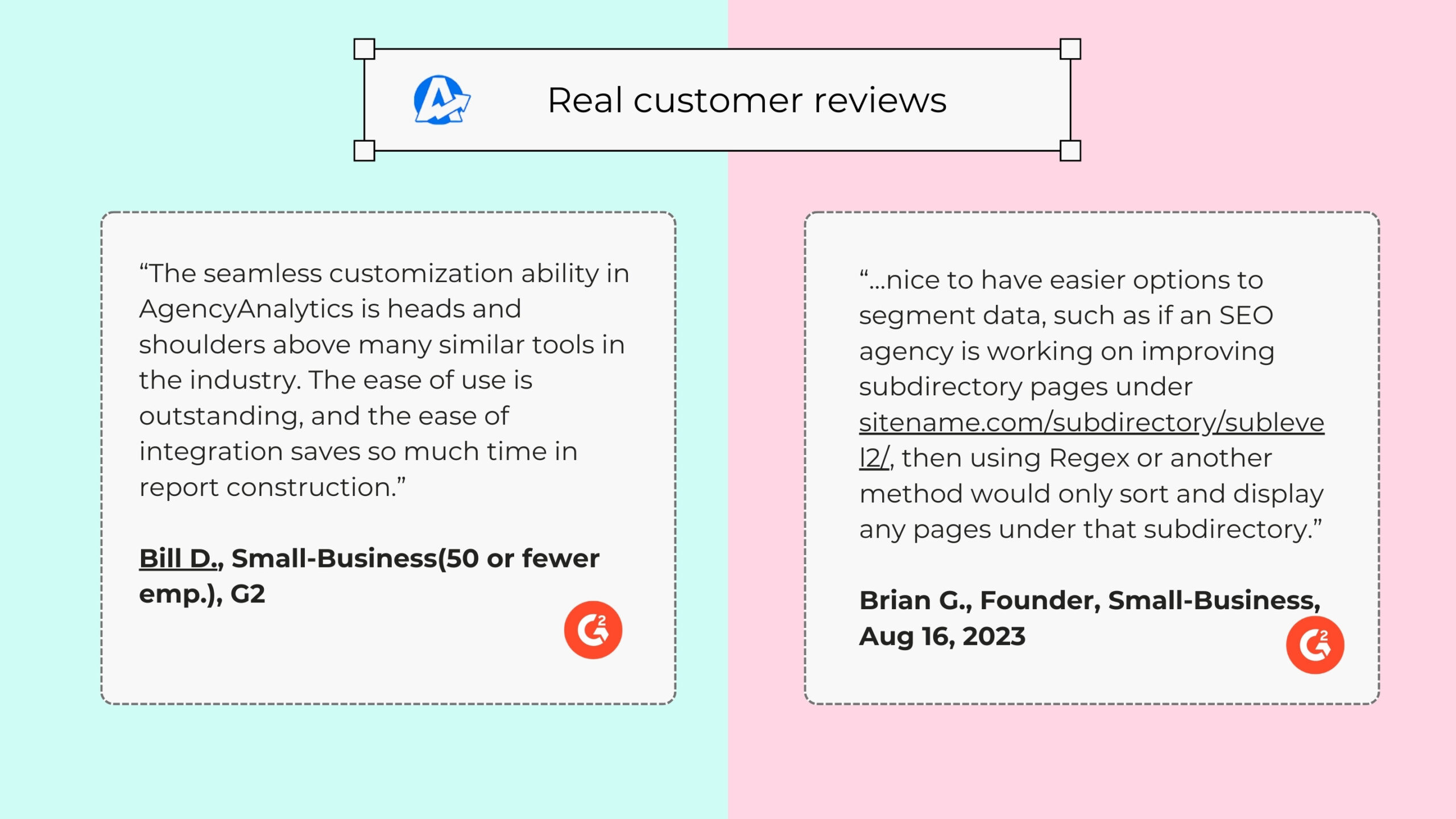
Polar Analytics
Polar Analytics is a no-code analytics and data integration platform for e-commerce Shopify brands with $2+ million annual revenue.All-in-one approach with custom dashboards, visualizations, integrations, conversion/attribution script, AI chat analysis, alerts, data transformation.
Automatically aggregates and combines channels to calculate CAC, LTV, retention, contribution margins, profits. Drawbacks: plans start $300/mo, not fully self-service, requires setup call.
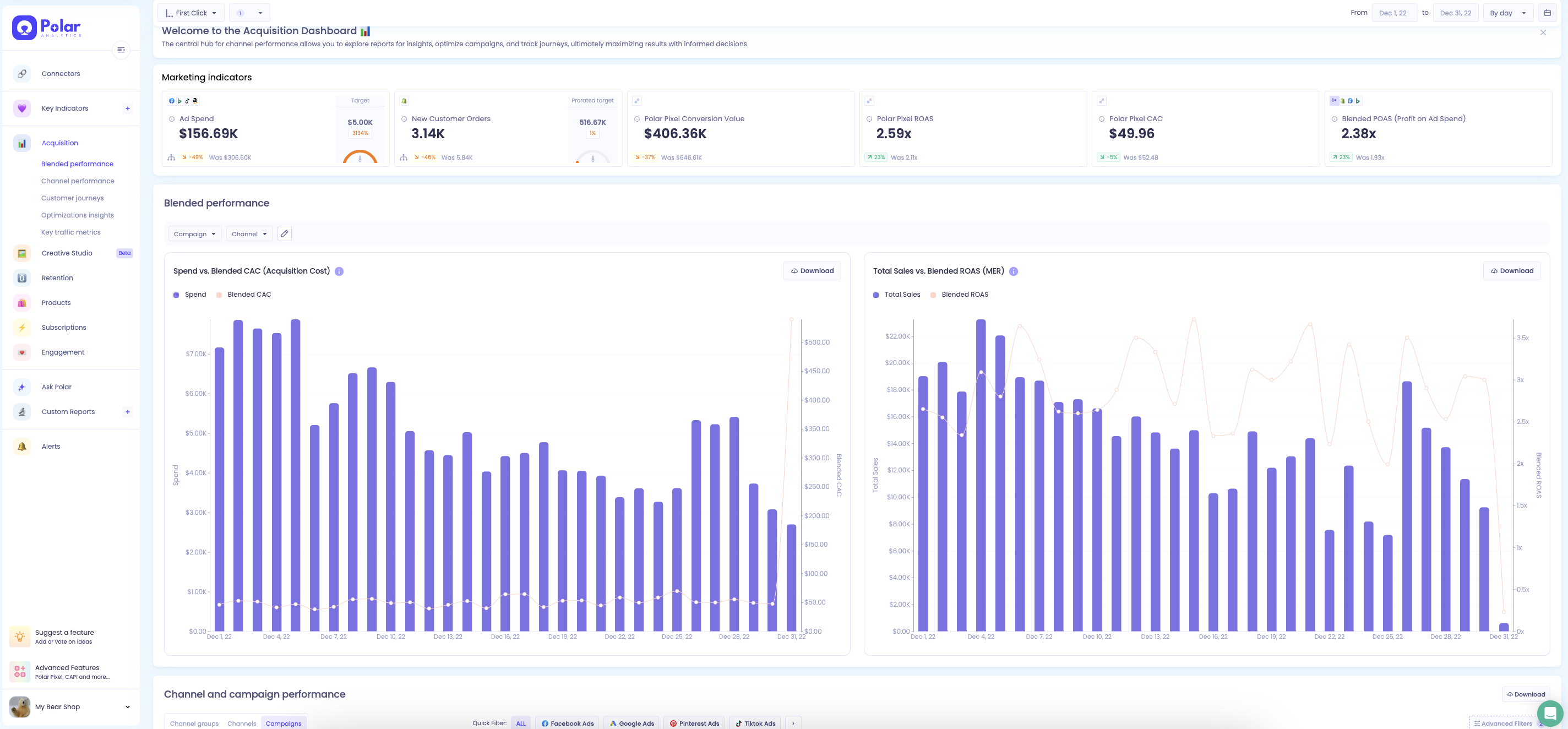
Dataslayer vs. Polar Analytics detailed comparison
| Comparison criteria | Data Sources | Data sources included in their first plan tier | Refresh time frequency | Refresh time frequency for their first plan tier | Report templates | Destinations | Starting price | Free trials | Pricing model | Users access | User reviews on G2Crowd | Drawbacks |
|---|---|---|---|---|---|---|---|---|---|---|---|---|
| Dataslayer | 45+ | All data sources (45+) ✅ | Daily, with API limits ⛔️ | Daily, with API limits ⛔️ | Yes ✅ | 4 | 35/mo | Yes✅ | Usage-based | Limited users per plan ⛔️ | 4,8 | Unpredictable pricing for high volumes |
| Polar Analytics | 45 | All data sources included (23+) ✅ | Daily ✅ | Daily ✅ | Yes ✅ | 2 | 300/mo | Yes✅ | Based on order volume | Unlimited users and admins ✅ | 5 | Less flexible than modular tools |
Polar Analytics pricing
Pricing is based on total tracked orders, starting at $300/month for 2,000 orders. Price per tracked order decreases with higher volumes, down to $0.04/order for over 50,000 orders per month. Enterprise plan pricing for companies over $20M GMV.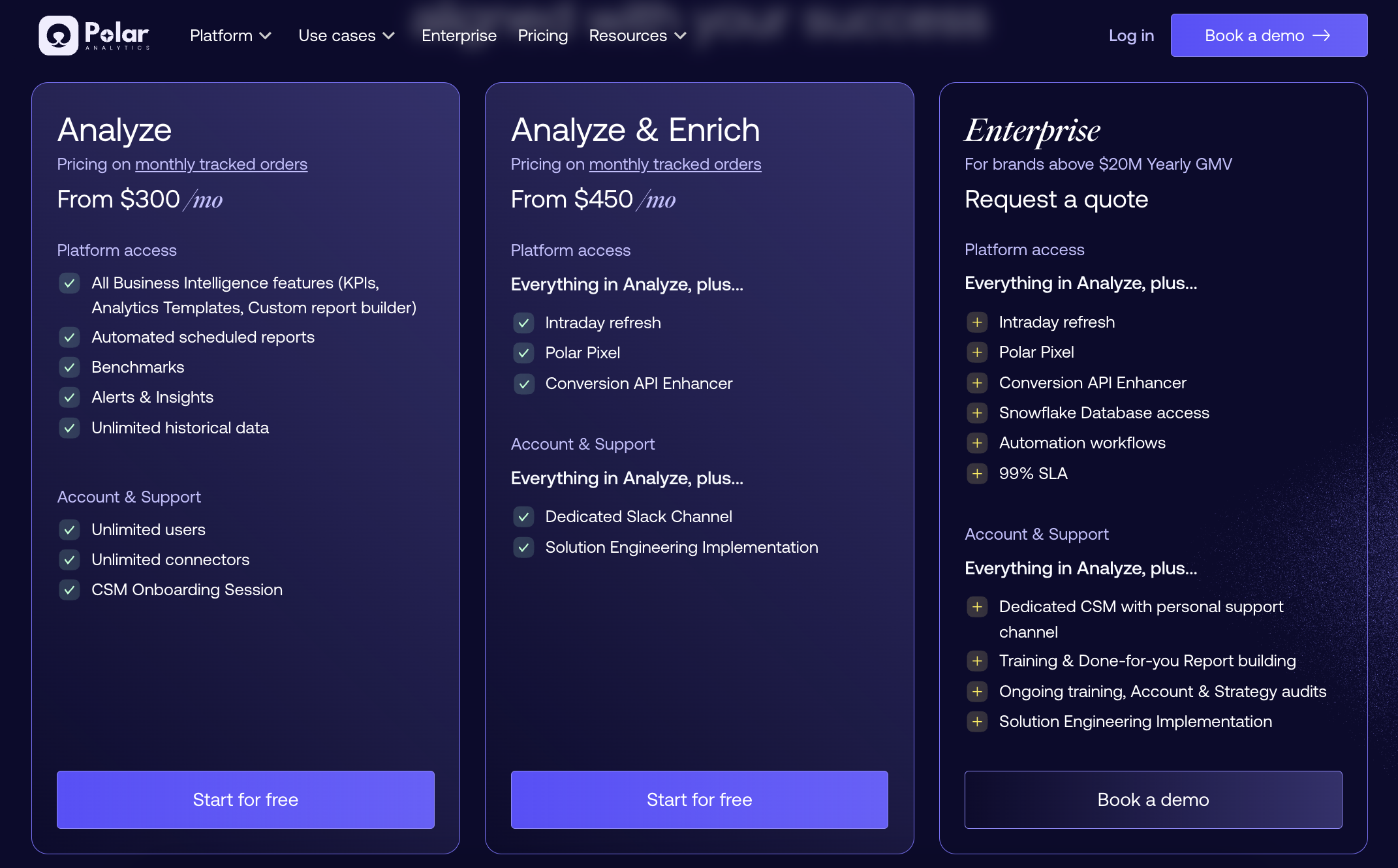
Who is Polar Analytics best for?
Polar Analytics offers a specialized solution for e-commerce brands, focusing on aggregating data from multiple marketing channels to provide insights into attribution and profitability. This makes it ideal for businesses needing a focused and comprehensive analytics platform.
However, DataSlayer is cost-effective for PPC/SEM marketers and agencies needing a flexible reporting tool that integrates seamlessly with Google Sheets, Looker Studio, various BI tools, and BigQuery. Its pricing model based on API calls can lead to unpredictable costs, which might be less ideal for teams needing budget predictability.
Pros of choosing Polar Analytics as a Dataslayer alternative
- Pre-built Shopify dashboards: sales, profits, CAC, AOV by marketing channel, SKU
- Consolidates Facebook Ads, Google Analytics, Klaviyo, ReCharge data in one place
- Calculates key DTC metrics automatically: MER, CPC, ROAS, LTV by segment
- Stellar support: users cite daily outreach, hour-long calls, technical assistance
Cons of choosing Polar Analytics over Dataslayer
The following are reasons to look for Polar Analytics alternatives.
- Incomplete metrics and documentation: lacks some specific analyses and metrics needed by marketing teams and agencies, such as outbound clicks for Facebook Ads
- Slow, delayed data retrieval: runs daily backfills by default, useful for weekly/monthly monitoring but unfeasible for day-to-day or real-time analytics like ad pacing or Black Friday events
- Some users report occasional “slow” load times in reviews on G2 and Shopify
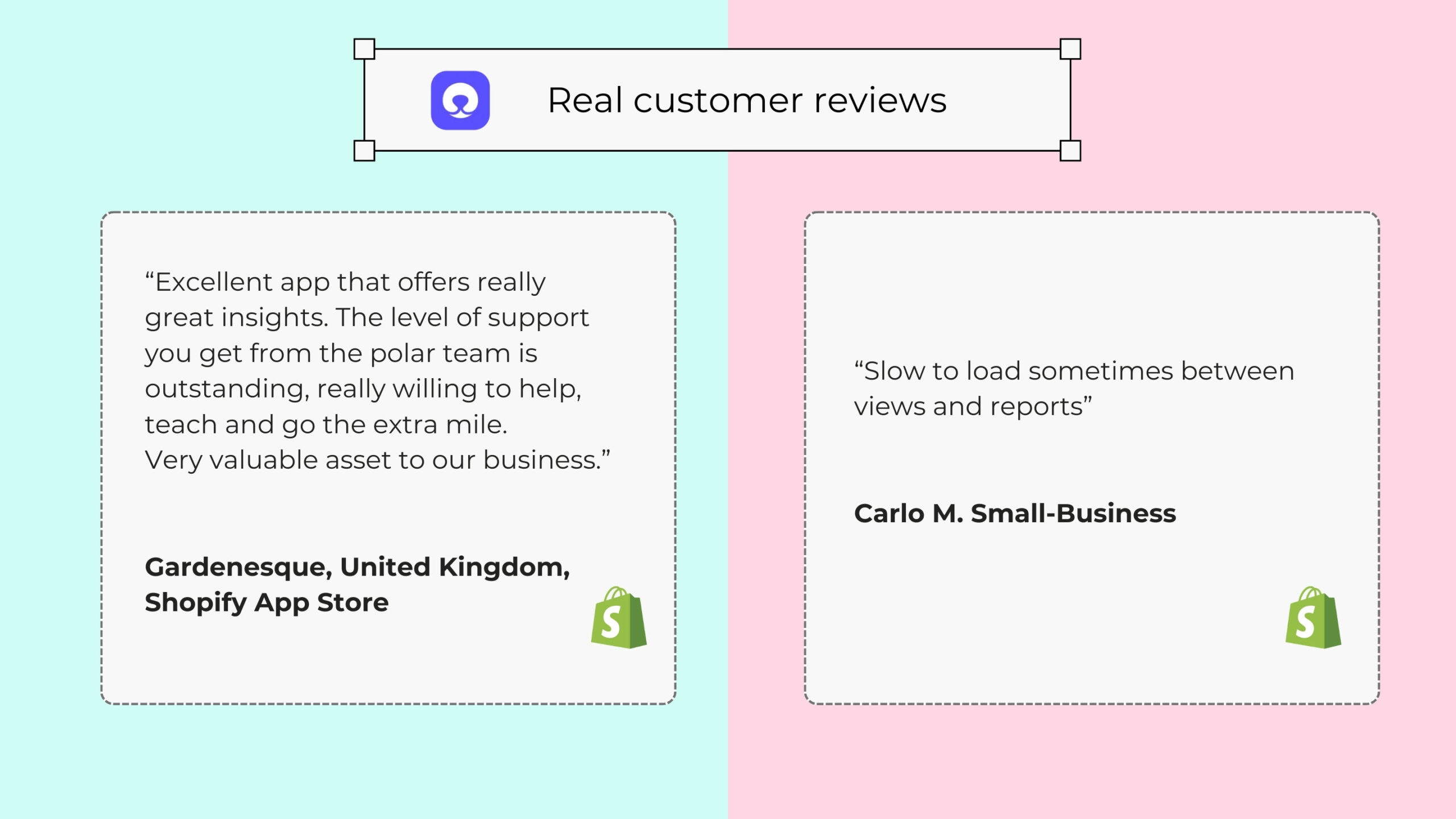
Other Dataslayer alternatives you should consider?
We have tested a lot of marketing reporting tools and white-glove services, here are other alternatives you should consider if you have time to keep exploring:
- Databox for easy-to-build marketing reporting.
- Equals for SaaS companies that want to measure their data in a tool that looks like Sheets.
- VisionLabs if you want custom data pipelines and reporting without using your internal team.
- Datapad if you want reports that look like a Notion report and are easy to build.
- Coefficient if you want an alternative to automate your Google Sheets reporting.
- Awesome Table is a great Google Sheets Supermetrics alternative.
- Swydo is an easy-to-use out of the box marketing reporting tool
Dataslayer overview
Dataslayer is an affordable ETL tool built PPC marketers. It has garnered impressive overall satisfaction scores (4.8/5 on G2). While offering marketing data integrations, its API query manager and BigQuery integrations also serve developers’ needs.
Reasons to seek Dataslayer alternatives
You may look for Dataslayer alternatives if:
- You prefer a predictable, flat pricing model instead of their usage-based pricing which can become unpredictable and expensive.
- You require greater speed and stability that Dataslayer lacks due to no built-in data warehousing or storage.
- You seek either a simpler plug-and-play reporting tool or a more flexible solution for developers.
The lack of predictable pricing, built-in storage for performance, and the need for simplicity or greater flexibility are potential reasons to explore alternatives to Dataslayer.
Dataslayer pricing explained
DataSlayer pricing is based on API calls and the number of accounts for Google Sheets and Looker Studio, starting at $34.99 a month for Looker Studio and $44.9 / month for Google Sheets.
They have one of the most tricky pricing models we’ve seen because an API call is different if you are exporting your data to Looker Studio or to Google Sheets.
An API call for Google Sheets equals one query (easy)
But for Looker Studio an API call equals the number of widgets you load in your report, and in one single page you can have more than 40 widgets between filters and charts. And the API call is used every time you or any of your team members or clients add, refresh, or edit one of them.
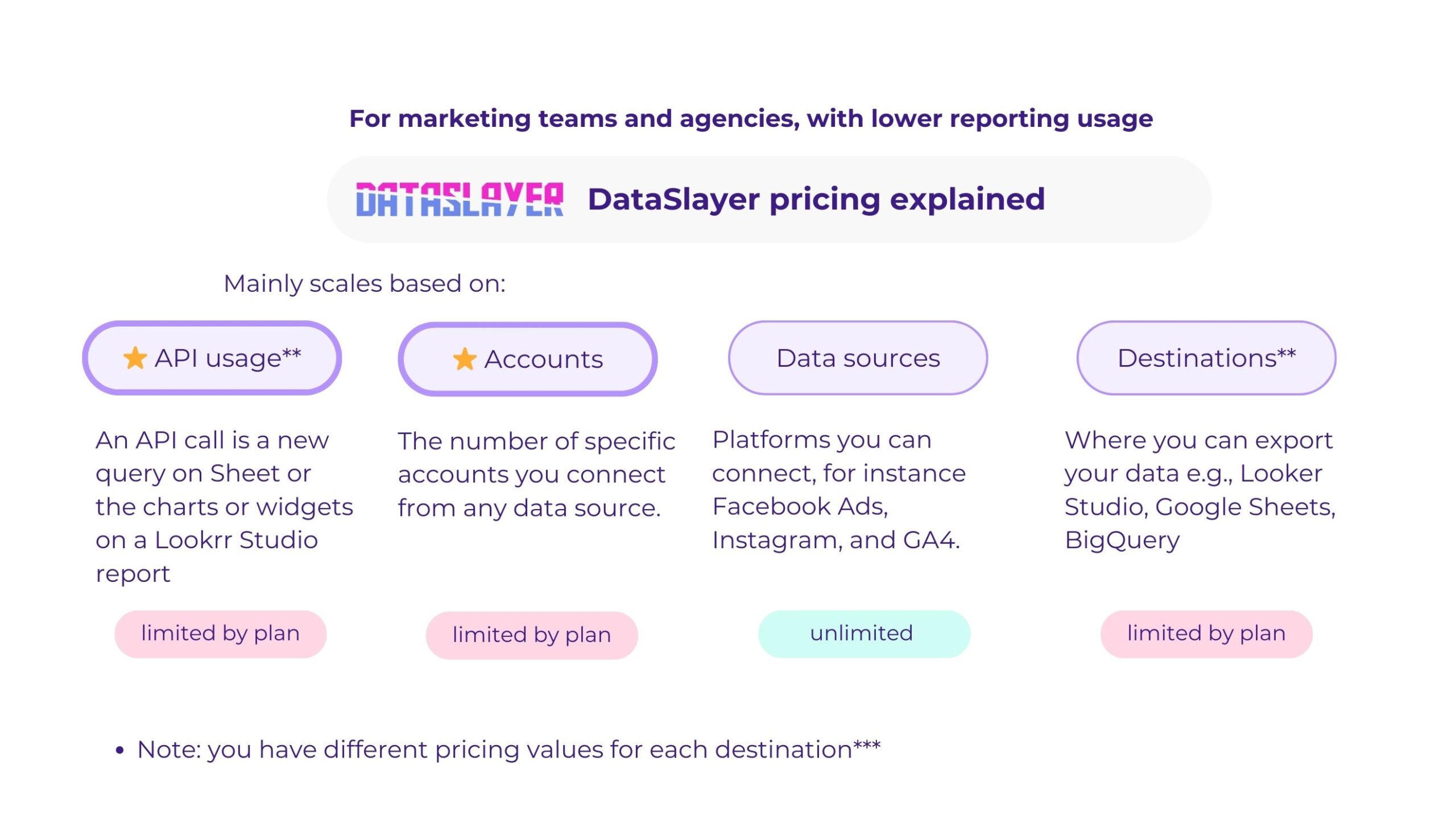
So you could think that they are ‘cheaper’ at the first glance, but are they cheaper? My guess is that they aren’t. Let’s see this with an example:
If you purchase their ‘Freelancer’ plan, you can access to 5 accounts per connector, but how does that translate into the use of the reports?
Well, in that plan you have 125 API calls per day in Looker Studio, that would be the equivalent of loading 4 Looker Studio reports with an average of 31 charts per report a day.
And I’m not taking into account that you share or edit the reports.
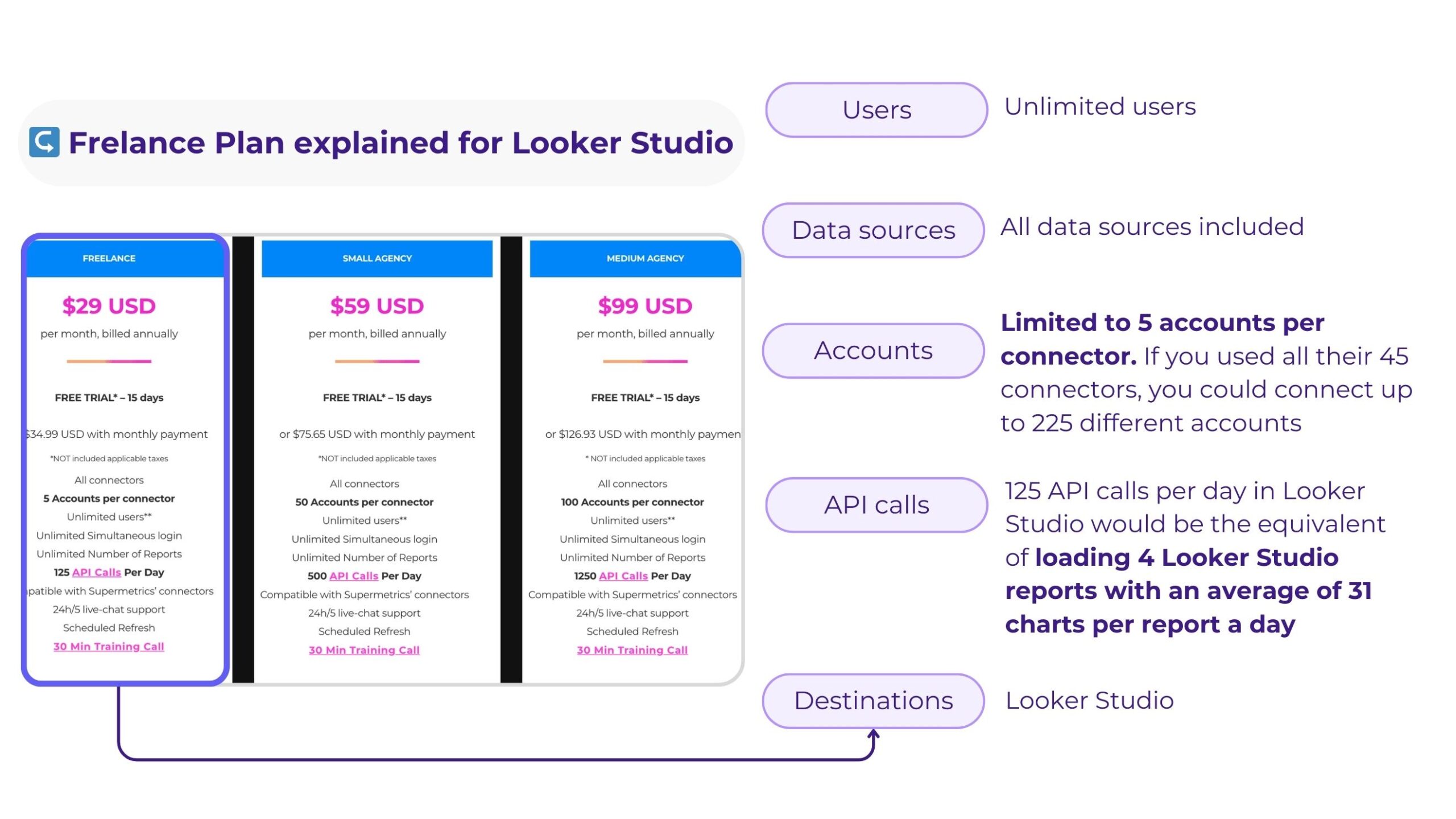
They mention you can upgrade your plan, but it’s not clear upfront how much it will cost an additional account.
If you prefer predictable pricing, then you should consider Porter Metrics or Power My Analytics.
Frequently Asked Questions (FAQs)
Is there a fully free Dataslayer alternative?
You can use the Google Native connectors that Looker Studio offers, such as Google Ads, Google Search Console, and Google Analytics 4.
However, if you want to integrate additional platforms, it’s better to choose another verified third-party provider, such as Porter Metrics or Funnel.io.
There are no truly good free alternatives to Dataslayer because developing and maintaining a comprehensive marketing data platform with robust API integrations across all major advertising and analytics tools is an extremely costly and complex undertaking:
- Building and maintaining API connections to dozens of marketing data sources requires significant engineering resources to handle varying data models, rate limits, and authentication methods.
- Calculating custom marketing metrics means translating complex formulas across disparate data sources and handling elements like campaign structure and ad creatives.
- Marketing data volumes can be massive even for smaller businesses, necessitating optimized data warehousing capabilities.
- APIs and data sources change constantly, requiring continuous integration updates and maintenance.
- Creating an intuitive UI/UX, rich visualizations, collaboration features and other functionality further adds to development costs.
While simple free marketing data connectors exist, building a truly full-featured free alternative with broad compatibility, customization abilities, and scalability is prohibitively expensive without a sustainable monetization model.
Why do people leave Dataslayer?
Most Dataslayer customers leave the platform because of: unpredictable pricing, slow reporting, inconsistent data formatting, and lack of transformation features.
- Unpredictable pricing: Dataslayer’s usage-based pricing model can lead to unpredictable costs, especially when compared to alternatives that charge based on the number of connected accounts. The pricing can even surpass that of leading competitors, and the fact that a separate plan is required for each data destination adds to the complexity [[3]] [[8]].
- Slow reporting: Because Dataslayer pulls data directly from APIs, reports can be slow or experience downtime. This is particularly noticeable when compared to alternatives that offer built-in data storage to ensure speed and stability [[2]] [[9]].
- Inconsistent data formatting: Some users have reported issues with the way data is formatted, such as percentages or dates, which can lead to discrepancies and require manual verification [[6]] [[7]].
- Lack of transformation features: Dataslayer does not offer extensive data transformation features, which means users may need to rely on external tools to blend and manipulate data [[1]] [[6]].
Is it easy to switch from Dataslayer to another solution?
Most of the top alternatives make migrating data connections and reports/dashboards from Dataslayer relatively easy. Many have import wizards and services to assist with the transition process.
For instance, if you move from Dataslayer to Porter Metrics, we will help you migrate all your reports for free.
Also, you can copy a dozen of templates that will help you change your reports without a lot of effort on your side. For instance, you can check these examples:



